What Is Experiential Tourism?
- Metropolitan State University
- Sustainable Fashion
- Art & Media
“Experiential tourism” has become a popular term for travel marketers, but it can mean different things to different people. For some, experiential travel means doing anything that falls outside of a standard sightseeing, museum-going itinerary. For others, it is defined by interactions with locals or by going to places that might not be considered tourist attractions at all.
The definitions might be different, but the goals of experiential travelers are usually similar: to immerse themselves in a way that leads to some sort of discovery, insight or inspiration. This travel philosophy is usually championed by fully independent travelers (those who travel without help from agents or guides), but tour companies and even non-profit organizations have embraced the trend, promising transformative experiences to people who buy their vacation packages or join their volun-tourism programs .
Is experiential tourism redefining travel or is it a fad that will eventually fade? If it is a lasting travel trend, how will it affect off-the-beaten-path destinations that usually do not see many mainstream tourists?

Leveling the field
For some places, the experiential travel trend could be a game-changer. Smaller destinations cannot hope to compete with tourism heavyweights when it comes to infrastructure, advertising budget and investment. They can, however, differentiate themselves by focusing on the unique experiences they offer.
Manitoba provides an example. The oft-forgotten Canadian province highlights how local tour companies and communities can use the experiential trend to gain an edge in the ultra-competitive travel marketplace. Travel Manitoba explains that small operators can “avoid unnecessary risks and major investments by shifting the opportunity focus from building more infrastructure to building the capacity of people who can tell your ‘story' and connect with the traveler.”
According to Manitoba’s tourism stakeholders, the “ingredients” of a successful experiential tourism strategy include hands-on activities and interactions with locals . They also highlight the need for guides to change their approach to guiding. The goal should be to facilitate tours so that tourists can make discoveries and gain insights on their own.
Can all smaller destinations benefit?
On paper, the Manitoba approach sounds like a great idea, but is it practical? Some conscientious travelers might choose a destination because they want to support such grassroots efforts, but most are, first and foremost, seeking experiences. If they want to succeed, these destinations have to deliver.
New Zealand’s tourism development in recent decades suggests that experiential tourism can indeed help off-the-radar places develop into mainstream destinations. Admittedly, this Southern Hemisphere country was able to take advantage of the buzz from the "Lord of the Rings" movies to help its tourism efforts. However, New Zealand has stuck with advertising campaigns that focus on adventure and culture rather than on attractions related to the popular films.
Adventure sports, culinary and wine tourism, and cultural excursions have led to a boom for New Zealand in both the U.S. and Asia Pacific markets. This has happened at a grassroots level, with more than nine out every 10 tour companies in the country having fewer than five employees. This means that even if people are there for the skiing or wine and nothing else, they will often be interacting directly with local people in a way that is more personal than in destinations with more traditional tourism infrastructure.
An emotional connection
Nova Scotia’s Cape Breton Island has, like Manitoba, published a list of ingredients, which they call “essentials,” necessary for a successful experiential tourism sector. Keywords like “hands on” and “authentic” are part of this document, but so is something else: “emotion.” In other words, the goal of travelers is to find experiences that allow them to feel a connection to a place rather than to just see it.
This is not a new idea. You often hear people express affection for major world cities like Paris, Hong Kong or New York without ever mentioning the Eiffel Tower, Victoria Peak or Times Square. Perhaps the real allure of experiential tourism is that it makes it acceptable to seek out this kind of emotional connection.
A win for sustainability
The issue of sustainability might be important to travelers, but it might not always be practical to travel in a sustainable way and to support the preservation of local culture and ecosystems. This is especially true in mainstream tourist destinations.
Experiential tourism, on the other hand, can make sustainability more practical when it comes to both culture and the environment.
How is this possible?
Uniqueness is one of the biggest assets that a place can have when it comes to experiential tourism. Ideally, tourists who are interested in this kind of travel would reward a destination for preserving its nature, culture, historic architecture and other aspects of their destination by spending their travel budget there.
Culinary tourism
Ulf Liljankoski / Flickr
One of the most popular forms of experiential travel is culinary tourism. This can involve visiting neighborhood restaurants or markets with a local guide, or it could be more in-depth and include cooking classes, wine tastings and even picking trips to farms or gardens. La Boqueria, a classic market in Barcelona, has been successful at offering cooking classes and other immersive experiences to people who would otherwise only come there to sightsee.
Food tourism is currently one of the most accessible forms of experiential travel. Tourists seem drawn to culinary experiences , proving that experiential travel can cross over into the mainstream. The foodie trend also shows that worries about the "McDonald's-ization" of the world are unfounded.
An authentic image
Andri Koolme / Flickr
Social media has played a part in the rise of culinary tourism. Whole social accounts are based on nothing but pictures of raw ingredients and beautifully plated dishes. This points to a larger trend that shows that, like it or not, social media is how people connect with and get inspired by like-minded travelers. What does this mean for experiential travel?
The “Instagram effect” is real, and marketing offices have started inviting photographers with large Instagram followings on press junkets. This has helped to redefine travel , with people wanting to have the same experiences as those they see on social media.
At a recent tourism event, the head of marketing for the Tourism Authority of Thailand, Chattan Kunjara na Ayudhya, pointed out that the process of taking images to post on social media can be beneficial for experiential travelers if the images are authentic. “An authentic image can tell a very complex story in a very simple way. These simple images are shared by travelers on a day to day basis.”
He went on the explain that destinations and tourism industry stakeholders should be responsible for presenting tourists with the opportunities to create such images. “We need to make sure that we are creating authentic experiences that are shareable."
Volunteer, see the world
Another aspect of experiential tourism involves immersing yourself in something that you are truly passionate about. This could be cooking, pottery or something more obscure, like the conservation of wild plants. Such nature-based immersive experiences are offered in Southern Oregon by the Wild River Coast Alliance , which organizes programs that support communities and ecology in the region.
For some, simply getting beyond the tourist trail and seeing the real culture of a destination is the ultimate example of experiential tourism. This has always been a popular option for youth travelers or so-called “gap-year” tourists. Tour packages offering such experiences often have an educational angle (studying abroad or participating in a language immersion program). Some involve homestays or volunteering on development projects while living abroad.
Understanding the place
Are tourists simply ticking experiences off their to-do list just as they’d tick off sightseeing sites, or are they actually gaining understanding of the places that they visit? The criticism of the experiential trend is that immersion experiences are, in general, just another way to package tourism. The trend may allow smaller destinations to capitalize on their unique attributes, but the travelers are still short-term visitors whose travel experiences are lacking .
Is it possible to be overzealous in this pursuit of experiences? In Luang Prabang, an historic city and UNESCO World Heritage Site in Laos, one tradition has become quite popular with tourists. The practice of donating food to feed the city’s monks occurs every morning. Local people congregate at the roadside and put food into the monks’ bowls as they walk past. Tourists began coming early in the morning to photograph the procession-like practice. Some even take part, raising concerns that this once quiet, solemn religious affair has descended into a noisy spectacle.
The Luang Prabang Airport reportedly has signs that offer advice on how to participate in the almsgiving in a respectful way.
The future of experiential tourism
The demand for air travel is expected to double in the next two decades. Tourism is growing at a steady rate. Despite criticisms and drawbacks, the growth of experiential tourism could allow smaller players in the tourism industry to benefit from this growth without having to sacrifice their culture, sell their land to developers or change the way that they live.
- What Is Ecotourism? Definition, Examples, and Pros and Cons
- Regenerative Travel: What It Is and How It's Outperforming Sustainable Tourism
- What Is Sustainable Tourism and Why Is It Important?
- What Is Community-Based Tourism? Definition and Popular Destinations
- What Is Overtourism and Why Is It Such a Big Problem?
- How to Be a Sustainable Traveler: 18 Tips
- Costa Rica’s Keys to Success as a Sustainable Tourism Pioneer
- Best of Green Awards 2021: Sustainable Travel
- New Zealand Aims to Become World's Largest 'Dark Sky Nation'
- Top 8 Agritourism Destinations in the World
- Artist's Viral Postcards Depict 50 American States in Climate Crisis
- 9 Not-So-Big Cities With Rich Cultural Scenes
- What Are the Three Pillars of Sustainability?
- How to Find the Perfect Second-Hand Wedding Dress
- 10 Small Towns With Big Personalities
- Floating Finnish Cabin Connects Guests to the Forest
National Geographic content straight to your inbox—sign up for our popular newsletters here

Is experiential travel the next big trend?
The nature of travel is changing, with a stronger focus on immersive experiences. What does this mean for travellers?
Broadly speaking, the concept of experiential travel refers to immersive experiences — the kind that aims to forge a deeper connection with a destination than can usually be had from traditional leisure holidays. These often involve an element of adventure, whether physical, cultural or spiritual. According to trend-spotting agency Mabrian, these kinds of trips are now almost as high on the average traveller’s wish list as more conventional holidays — defined as involving activities such as sunbathing, family gatherings or shopping.
Where are people going?
Experiential travel usually delves deeper into a given destination, ensuring visitors can experience it as authentically as possible. As such, tours tend to focus on less-touristy spots. Since the pandemic, for example, upmarket ski specialist Powder Byrne has found that destinations like Japan better represent a blow-out family ski trip than somewhere such as Switzerland. Add-on experiences such as temple tours and samurai sword-fighting displays add extra dimension.
What kind of trips are being taken?
Active adventures are growing in popularity, with more extreme options on offer than ever before. An example includes the Shackleton Challenges. Launched to complement Shackleton’s polar-proof outdoor clothing, they’re — for the most part — Arctic and Antarctic mini-expeditions. Even the entry-level Polar Skills Challenge in Norway involves hauling a pulk (an equipment-laden sled) as you ski tour across the snow.
What about closer to home?
The growth of experiential travel isn’t restricted to long-haul pursuits. Take, for example, the popularity of wild camping in the UK. Of course, lovers of Britain’s national parks have been doing it for generations. But when a YouTuber such as Claire Wildbeare attracts an audience of 220,000 subscribers and posts 113 wild-camping and bivouacking videos — closely followed by fellow YouTube star Paul Messner — it’s clear something extraordinary is going on. Every weekend, it seems, a small army of thrill-seekers is dispersing across Britain’s moors, fells and munros. Their mission: to experience Britain in its rawest, most unvarnished state. As a result, mountain sports outfitter Ellis Brigham has seen its robust, weatherproof tents fly off the shelves. “It seems that enthusiasm for the adventurous side of camping is stronger than ever,” observes Luke Scrine, the brand’s chief tent buyer.
What if it’s not for me?
Of course, not everyone wants this kind of experience. People still fly and flop in their millions. And while some well-heeled travellers are hoping to come back with tales of life-changing encounters in faraway places, others are flocking to the next must-stay luxury hotel. HBO’s TV series White Lotus was cynical about such behaviour in 2021 and 2022, but that didn’t stop demand for the property featured in its second series — the Four Seasons Hotel in Taormina, Sicily — skyrocketing in the show’s wake.
What are the benefits?
The deeper we get into a destination, the more widely our money spreads. Original Travel’s Tom Barber is well aware of the benefits. “We’re big promoters of community-based tourism,” he says. “We identify locally owned accommodation, restaurants and activities so our clients can make informed decisions as to where their money goes. It’s important not to be preachy, but more and more clients are opting for experiences and accommodation where they know their money can be used to make a genuine difference.”
The benefits remain for the traveller, too. Spending time chatting to locals and getting to know about their day-to-day lives — including tour guides, hosts and others who work in tourism — could provide meaningful insight into the lived reality of a given destination. These kind of colloquial exchanges also contribute to a more comprehensive understanding of a place, which could prove just as memorable as a guide’s treasure trove of facts and history.
What do I need to know?
Travellers should check the exclusions on their travel insurance policy closely before they go, particularly if there are likely to be physical activities. There will also likely be a level of fitness required for some activities too — check you’re fully prepared before booking.
FREE BONUS ISSUE
Related topics.
- EXPEDITIONS
- PEOPLE AND CULTURE
- EXPLORATION
You May Also Like

Who were the original 49ers? The true story of the California Gold Rush

Get ready for your next iconic adventure like a pro with these tips

Maritime archaeologist Mensun Bound delves into 30 years of underwater adventures

11 of the best wildlife cruises for 2024 and beyond

5 game drive alternatives, from cycling to horse-riding
- Perpetual Planet
- Environment
- History & Culture
- Paid Content
History & Culture
- Mind, Body, Wonder
- Terms of Use
- Privacy Policy
- Your US State Privacy Rights
- Children's Online Privacy Policy
- Interest-Based Ads
- About Nielsen Measurement
- Do Not Sell or Share My Personal Information
- Nat Geo Home
- Attend a Live Event
- Book a Trip
- Inspire Your Kids
- Shop Nat Geo
- Visit the D.C. Museum
- Learn About Our Impact
- Support Our Mission
- Advertise With Us
- Customer Service
- Renew Subscription
- Manage Your Subscription
- Work at Nat Geo
- Sign Up for Our Newsletters
- Contribute to Protect the Planet
Copyright © 1996-2015 National Geographic Society Copyright © 2015-2024 National Geographic Partners, LLC. All rights reserved

What is experiential travel?
Disclaimer: Some posts on Tourism Teacher may contain affiliate links. If you appreciate this content, you can show your support by making a purchase through these links or by buying me a coffee . Thank you for your support!
Experiential travel is the one of the latest trends in the travel and tourism industry. Increasing in popularity, this type of tourism is often viewed as ‘good’, frequently facilitating niche tourism or sustainable tourism endeavours. But what actually is experiential travel and what is it all about? Read on to find out….
Where did experiential travel come from?
Why is experiential travel on the rise, how is experiential travel marketed, examples of experiential travel , how to make your trip more experiential, why is experiential travel a good way to see the world, further reading.
Put simply, experiential travel is travel that focuses on experiences first. It is a world away from spending a week lying on a beach or around a pool – though of course there is nothing wrong with tourism like this, and it’s something we all need from time to time! Experiential travel is also known as immersion travel. This is because people ( tourists ) are fully immersing themselves in a particular culture or a certain place – whether that be a specific site or a general country.
When travelling in this way, tourists will actively seek out and engage in things that make the place what it is. This includes eating local food, learning about the history of a place, speaking to the people who live there and so on. Experiential travel is very often transformative for people.
Nobody particularly invented experiential travel. Since the dawn of time (almost…) people have been travelling from their hometown to another place, and taking the time to engage with and learn about that destination. However, the concept does have a name now. Experiential travel has been likened to the concept of experiential education (which I discuss in my article on educational tourism ), which was first discussed by John Dewey in his 1938 book Experience and Education .
Dewey was an educator and philosopher. Study.com says, “John Dewey is probably most famous for his role in what is called progressive education. Progressive education is essentially a view of education that emphasizes the need to learn by doing. Dewey believed that human beings learn through a ‘hands-on’ approach. This places Dewey in the educational philosophy of pragmatism .
Pragmatists believe that reality must be experienced. From Dewey’s educational point of view, this means that students must interact with their environment in order to adapt and learn. Dewey felt the same idea was true for teachers and that teachers and students must learn together. His view of the classroom was deeply rooted in democratic ideals, which promoted equal voice among all participants in the learning experience.”
So, experiential travel is a similar type of thing. It was first mentioned itself in 1985, in a book called Insights in Strategic Retail Management by John Gattorna . The concept was described as being “where the destination is not as important as the experience which can be had there”. And this is exactly what it is!

People are looking more and more towards ‘doing’ things while travelling, rather than spending time just switching off and relaxing. But why is this? There are many reasons, including wanting to gain new knowledge and also emulate experiences we may have seen in films, on TV and on social media or blogs. But overall, there is an evident movement by consumers away from the traditional sun, sea and sand holiday model towards more unusual and immersive forms of travel.
And people don’t just want to have an immersive experience, they want to share it with the world too! UK-based holiday home insurance provider Schofields ran a survey that showed that 40.1% of ‘millennials’ consider whether or not a place is Instagrammable as their top priority when choosing and booking holiday destinations. People like to post stories and images that make them stand out from the rest of the crowd. Be that their friends, fans or just general social media followers!

Especially following the pandemic, people are really looking to get out and *do something*. Adventures are good for the soul, a chance to make memories and really live. For many, it feels like there hasn’t been a lot of chance to live over the past couple of years. So heading to a new and exciting destination and trying new activities, meeting new people, tasting new foods… it’s invigorating!
Experiential travel is rarely given this title when it is being sold. It is repackaged and relabelled, often called ‘adventure travel’ or ‘experience travel’. Scott Dunn , a luxury travel brand, is one company that do market this type of travel as being experiential. They describe it as being ‘ immersive, adventurous and authentic. A journey that gets you beneath the skin of a culture to experience life as a local. That could mean thrifting with a fashion designer in Milan or dining with a food blogger in Cape Town. In a work hard, play hard world, we design trips that challenge your perspective to encourage you to rethink your relationship with people and places’.
Experience Travel Group , which offers experiential travel throughout destinations across Asia, describe it as ‘boutique holidays for curious travellers’. And travel group Exodus offer adventure holidays, which boils down to experiential travel. They say “there’s something about the feeling of visiting a new country, culture or environment – whether that’s a mountain range, desert or jungle – that just can’t be beaten”.
Anything that is marketed as an adventure will be a chance to try experiential travel. Essentially if you’re not lying on a sunbed drinking cocktails and perusing the buffet for 2 weeks, your trip is probably some kind of experiential travel… or at least it can be!

Because the term experiential travel is broad, it naturally encompasses many different types of tourism and holidays that come in all sorts of shapes and sizes. A tourist might achieve an immersive experience by staying in a homestay and getting to know the local people and culture or they might choose to donate their time by taking a volunteer tourism trip. Travelling to places that are off the beaten path, such as Inner Mongolia or the Chinese Silk Road can be a great way to ensure that you have an immersive experience too.
Other ways that tourists might choose to experience experiential travel might by climbing Mount Toubkal or diving in Dahab . They might do a road trip through Canada or take a city break to Shanghai. Visiting these places and taking these trips doesn’t entirely make your experience one of ‘experiential travel’, however. It’s all about getting under the surface. So when you’re away on a city break, you might take a cooking class or a food tour- choose this rather than just heading to the city’s most popular restaurants or ask for ‘off the beaten track’ recommendations from locals, from taxi drivers, from shop assistants etc.
Experiential travel is a about immersion. There are many, many ways that you can be immersed in the local culture and way of life! Here are a few examples:
- Book a homestay or use a housesitting app – find out more about homestays here !
- Take a walking tour led by a local
- Book a cooking class making local dishes
- Eat at independent restaurants
- Join in with a community-improvement activity such as a beach clean up
- Experience local entertainment like a gig, football game or theatre show
- Speak to as many people as you can
- Use local/independent taxi firms rather than Uber
- Do some volunteer work
- Stay in the destination for an extended length of time e.g. through slow tourism
- Get off the beaten path
Experiential travel is so good for you. It helps broaden your horizons and teach you new things: you might learn a language, pick up some new recipes, learn the history of a culture you may not have even heard of before. It can change your perspective on things when you see the way other people live. A huge part of it is letting go of the stereotypes you might have (consciously or subconsciously) created in your mind about a community, a place, a certain group of people. Be willing to change your beliefs!

Experiential travel is also brilliant for local communities. Visiting a small, family-run restaurant rather than a chain, for example, ensures that your tourism dollars are benefiting real, local people and prevents economic leakage in tourism . This in turn helps to protect the culture we are absorbing on our travels. And visiting local communities, especially small tribes such as the Long Neck Tribe in Thailand , helps prevent globalisation and development in a way. By spending the time travelling to places to (respectfully) see and interact with these groups, tourists can help communities to achieve positive economic and social outcomes.
If you have enjoyed this article I am sure that you will love these too:
Ethical tourism: Everything you need to know
The human zoo | A simple explanation
Are zoos ethical? The pros and cons of visiting the zoo
Volunteer tourism: Everything you need to know
Liked this article? Click to share!
Experiential Travel: Creating Memories, Not Checklists
Trends in the tourism industry are constantly evolving, and experiential travel is one of the latest trends that has only increased in popularity over the years. The key point of experiential travel is to create memories that will last you a lifetime, and if that sounds like exactly your type of travel, this guide will be helpful.
What exactly is experiential travel, why should you engage in it more often, and the top tour operators for experiential trips are just some of the key things covered in this detailed guide. Keep reading to learn more about experiential travel and see why so many people have become engrossed with it!
What Is Experiential Travel?
Experiential travel is a travel method that has been talked about for decades but has become increasingly popular over the last few years. It’s essentially a way of traveling that allows you to really dig deep into the local culture and fully experience every new place you visit.
Experiential tourism is mostly focused on experiences as opposed to destinations. It also entails spending more time with locals and exploring off-the-beaten paths, instead of just visiting tourist attractions with the highest ratings on Trip Advisor and Google Maps.
This type of tourism is also known as immersion travel because it entails travelers being fully immersed in a local culture. I like to think that immersion travel is just one aspect of experiential travel, and that adventure travel is just as an important part of it.
You can immerse yourself in a local culture all you want but if you don’t actually have authentic local experiences, I don’t think you can still call it experiential travel.
The complete opposite of experiential travel would be something like traveling to a foreign destination and staying at a resort the entire time you’re there. Sure, it’s nice to relax for a few days and spend your time sipping cocktails on the beach, but can you really say you’ve visited Mexico if you’ve never left the hotel? Experiential travelers would disagree.
Benefits of Experiential Travel
The main advantage of experiential travel is that you will end your trips feeling enriched by local cultures, and you will create memories that will last forever. You will actually get to learn and understand the history and traditions of a place, and if you do it right, you can make friends everywhere in the world.
Another benefit of experiential travel is that it should be more affordable. You wouldn’t stay in a fancy hotel, but rather in an apartment rented out by a local. You can even look into house-sitting and pet-sitting options, or just stick to couchsurfing for the most authentic experiences.
Choosing local accommodation instead of mass hotel chains allows you to get in touch with the hosts, which can provide valuable tips about the local communities and the destination’s culture.
Examples of Experiential Travel
When I plan a trip to a new country, I usually start off by creating a map on Google Maps with all the most famous landmarks, tourist attractions, and museums. I prefer to do things by myself and I avoid hiring guides and travel agents, so I do aim to achieve some level of immersion into local culture.
I also make it a point to eat at as many local restaurants as possible and try all the most famous foods in that city. The opposite would be sticking to Burger King or McDonald’s because they’re “safe” options.
While all of that is part of immersion travel, a true experiential traveler wouldn’t aim to visit just the most famous attractions in a new city. Instead, they would look for knowledgeable locals who would help them find all the best-hidden gems and places that locals enjoy the most. It could include visiting a quaint restaurant with the best local cuisine or partaking in an activity that is specific to that city.
It means joining a pasta-making class when you’re in Italy, partaking in a Flamenco dance class while you’re exploring Spain, or attending a local football game when you’re staying in England.
Planning an Experiential Travel Trip
When you’re planning an experiential travel trip, try to focus on encountering authentic local experiences. I would suggest starting off with a quick walking tour of the city. But try to look for local guides that do these tours in smaller groups – it will be a much more immersive experience and you’ll get to actually learn something, especially if you’re spending time with like-minded travelers.
Then, I suggest you do some research about the cuisine of the place you are visiting and learn about the different local dishes. Try to find restaurants that are frequented by locals – if you’re not having too much success, ask your host or a local guide for recommendations.
I’ve found that asking people on Reddit can also yield some great results because there are often locals who are willing to help tourists get to know their cultures.
Next, consider what the country or city you’re visiting is most famous for and try to find attractions or experiences that incorporate that to really get a sense of how the locals are living. An example of this would be going on at least one hike if you’re traveling in the more rural areas of Switzerland, or swimming in the Rhine River if you’re staying in Basel because it’s what the locals actually do.
Top Experiential Travel Companies
Velocity black.
Velocity Black is one of the best examples of a modern concierge service that goes above and beyond for its clients. Services offered by the company include organizing trips and holidays that are tailored to your wants and needs. Velocity Black can offer its members deals on flights with the world’s best airlines, free upgrades, and access to some of the best hotels in the world.
The company is also able to organize special experiences for its clients, which range from hanging out with celebrities to swimming with orcas. The annual membership fee is £2,000 and there’s currently a waiting list to join.
Vivid Travel
Vivid Travel is an experiential travel company that focuses on creating personalized travel itineraries for their customers. The agents will ask you questions about preferences for accommodation, ideas for experiences, and attractions, but also about your budget and preferred vacation length.
Then, they can create you a unique itinerary that explores all the things that interest you the most, while staying within your budget. They’ll do all the booking for you, and it’s a great company to use if you don’t like doing the research and bookings yourself.
Niquesa Travel
Niquesa Travel is another tour operator that specializes in custom travel itineraries. It’s more of a luxury travel company, so not the best operator to use if you’re trying to travel on a tighter budget. The company can plan and organize every aspect of your trip, from flights to immersive experiences.
You can contact Niquesa Travel to arrange any type of trip you want, and they also have a few pre-made itineraries that sound amazing. Travel to Morocco on a limited budget and follow a series of clues as you explore the local culture, or go on a road trip through England in a supercar.
Black Tomato
Black Tomato is a favored luxury travel company for experiential travel. This company has pre-made itineraries for virtually every corner of the world, but its agents can also create entirely new customized itineraries for customers.
Trekking in Nepal, safaris in Uganda, and sailing in the Galapagos Islands are just some examples of trips this company can arrange for you. Allowing Black Tomato to plan your trip means you’ll need to tell them everything about your preferences and budget, and they’ll do absolutely everything for you from booking the plane tickets to reserving you a spot in the pasta-making class in Tuscany.
Abercrombie & Kent
Abercrombie & Kent is one of the oldest luxury travel companies with a history of more than six decades. The company is known for incredibly detailed personalized itineraries, as well as excellent service.
Booking a trip with Abercrombie & Kent means that you could attend a private tour of a museum, get customized meals, and stay at places that are off-limits for regular people. This is one of the priciest tour agencies for experiential travel, but also one that can offer you a unique and personalized experience in every corner of the world.
Current Trends in Experiential Travel
Trends in the travel industry are constantly changing, but the core of experiential travel will always be immersive experiences. Adventure tourism is becoming an increasingly important part of experiential travel, and more and more travelers are spending their time hiking, backpacking, rafting, skydiving, and engaging in all sorts of other adventures that are typical for the places they are visiting.
Meaningful engagement with the local communities is also a growing trend in experiential travel. Forming an emotional connection with people in a foreign place is essential for creating lifelong memories, and an increasing number of people will spend their time visiting schools, museums, theaters, and similar places that the locals frequent in their daily lives.
But the way I see it, you should focus on experiences you’re genuinely interested in, and skip any experiences you might not enjoy, regardless of how local they are. An example of this would be if you were in London – maybe it would be a truly authentic local experience to spend an afternoon at a pub and go to a football match, but if that’s not something you would genuinely enjoy, you absolutely shouldn’t do it.
Instead, do something that’s fun for you – see a play at the Globe Theater, or spend an afternoon in the Natural History Museum, if that’s more up your alley.
The Future of Experiential Travel
Even with the rise of experiential travel among young adults, there is still absolutely a market for those who prefer to spend their vacation days lounging and relaxing. However, experiential travel has become extremely popular over the past few years, and it was in part a result of the global pandemic of 2020.
Most of the world was stuck for nearly a year, unable to leave their house properly, let alone travel to a new destination. When the countless restrictions were finely dropped and we were allowed to start traveling again, people wanted to get out of the house and do something.
The future of experiential travel lies in more personalized experiences and sustainability. More and more tour operators are shifting to offering immersive travel experiences to satisfy the growing demand for experiential trips. Also, the importance of AI is growing at the same time as the demand for experiential tours, and it’s hard to imagine a world in which the two don’t become integrated.
It’s expected that travel companies will turn to AI to help create unique and personalized itineraries and that VR will become a bit component of experiential travel. It’s only a matter of time until VR allows us to become fully immersed in destinations that we cannot physically visit, whether it’s a trip to Macchu Picchu from the comfort of your couch or a tour of ancient Rome.
About the Author Anna Timbrook
Anna is the co-owner of expert world travel and can't wait to share her travel experience with the world. With over 54 countries under her belt she has a lot to write about! Including those insane encounters with black bears in Canada.
Leave a Comment:
Save my name, email, and website in this browser for the next time I comment.
- Overview Guide
- 1 Week Itinerary
- Train Journeys
- Epic Drives
- Stunning Lakes
- Historic Castles
- Lauterbrunnen
- Grindelwald
- Chocolate Tours
- Swiss National Park
- Majestic Mountains
- Spectacular Waterfalls
- Famous Things
- Tasty Fondue
- 10 Day Itinerary
- Cherry Blossoms
- Tokyo Shrines
- Dos and Don’ts
- Osaka Guide
- Osaka Itinerary
- Osaka or Kyoto
- Kyoto Day Trips
- Matsumoto Castle
- Tokyo Luxury Hotels
- Island Hopping
- Best Campsites
- Driving Tips
- Beaune, France
- Barcelona Itinerary
- Spain Itinerary
- Greece Itinerary
- Italy Road Trips
- Berlin Day Trips
- Norway Northern Lights
- Netherlands National Parks
- Mostar, Bosnia
- Best Airlines
- Midwest Ski Resorts
- Florida RV Parks
- Washington RV Parks
- Oregon RV Parks
- Utah Camping
- Texas Camping
- Chicago National Parks
- East Coast National Parks
- Colorado National Parks
- Joshua Tree
- Yellowstone
- Alberta Hikes
- Flashlights
- Water Filters
- Sleeping Pads
- Solar Lanterns
- Tent Brands
- 4-Person Tents
- 4 Seasons Tents
- Backpacking Tents
- Beach Tents
- Cabin Tents
- Multi-room Tents
- Pop-up Tents
- Truck Bed Tents
- Underwear (Men)
- Backpacks Under $100
- Microspikes
- Boonie Hats
- In The World
- New Zealand
- Hardisde Luggage
- Lightweight Luggage
- Luggage Sets
- Spinner Luggage
- Durable Suitcases
- Duffel Bags
- Kids Luggage
- Teen Luggage
- Space Saving Luggage
- Business Carry-Ons
- Garment Carry-Ons
- Suitcases Under $50
- Travel Briefcase
- Zipperless Suitcases
- Rolling Briefcase
- Luggage Straps
- Luxury Brands
- American Tourister
- AmazonBasics
- Delsey Chatelet
- Anti-Theft Backpacks
- Backpacks Under $50
- Baby Carrier Backpacks
- Cooler Backpacks
- Backpacking Backpacks
- Climbing Backpacks
- Backpacks for Back Pain
- Beach Backpacks
- Hiking Backpacks
- Business Travel Backpacks
- Laptop Backpacks
- Backpacks for Tablets
- Commuter Backpacks
- Travel Backpacks (Men)
- Travel Backpacks (Women)
- Waterproof Backpacks
- Wheeled Backpacks
- Down Jackets
- Down Parkas
- Fleece Jackets
- Hardshell Jackets
- Rain Jackets
- Softshell Jackets
- Eco Friendly Jackets
- Gore Tex Alternatives
- Heated Jackets
- Lightweight Jackets
- 3-in-1 Waterproof Jackets
- Parajumper Jackets
- Rain Poncho
- Ski Jackets
- Travel Hoodies
- Travel Jackets
- Winter Coats
- Helly Hansen
- Mammut Jackets
- Patagonia Nanopuff
- Survival Jackets
- Flower Captions
- Waterfall Captions
- Tree Captions
- Sunset Captions
- Sunflower Captions
- Rainbow Captions
- Paddle Boarding Captions
- Hot Air Balloon Captions
- Kayaking Captions
- Airplane Captions For Instagram
- Forest Captions
- Switch skin
What is Experiential Tourism? and Why is It Important?
The power of experiences.

Travel and tourism nowadays include many different segments of being able to explore the world. From agrotourism to alternative tourism and many other definitions in between, the message is clear: more and more travelers are looking for positive ways to experience the world and we are here for it. One of these modes of travel is experiential tourism.
What is Experiential Tourism?

The term experiential tourism or experiential traveling has been making its way across the globe and we are here to explain experiential tourism and why it is important.
Experiential travel can be defined as a form of tourism that focuses on engaging with a country’s culture, food, history, heritage and environment.
Rather than going to a foreign country and relying on familiar sights and experiences from back home, experiential tourism relies on truly that….experiencing.
The experience itself can be leisurely or even enjoyable but truly allows you to experience any given moment or event. For instance, many people from a different cultural background may take some cultural awareness like Siesta, which is practiced in many different countries as an experiential touristic experience.

Which can also be commonly phrased as immersion tourism. The goal for the traveler is to take part in the culture and place they are visiting.
Why is Experiential Tourism Important?
Experiential tourism also demands that the traveler take personal involvement through different social and emotional cues. There is communication, even if it is not language for the host (local of the country) and guest (traveler) to work together in bridging the experience through their different perspectives and experiences.
And according to experts, anything that stimulates our senses, heart and mind play a central role in how we make meaning of the world around us. They can also encourage connectivity through meaning and memory. Imagine leaving a destination and coming back to be able to share insightful stories and traveling experiences? Priceless!
For instance, think of a time, right now, where you traveled and may have subconsciously participated in experiential tourism. Did you figure it out? Good! How much more meaningful or perceptive was the experience versus your other traveling experiences?
When the Grand Tour of India began, local tourism benefited greatly from this experience as people were more motivated to travel through the engagement of locals (Bashir and Gupta, 2017).
And financially, it shows. American Express, a credit card company conducted their own survey in 2013 which highlighted that over 72% of its respondents said they would prefer spending their money on experiences rather than things.
On the other hand, when locals involved in tourism consider keeping their ancestral traditions alive as part of the traveling experience, it actually allows for these ancestral traditions to get passed down, rather than dying off. (Sotomayor et al, 2017).
But, how do we ensure that experiential tourism continues to stay authentic?
This question is both easy and difficult to answer. Philosophically, we build our experiences and perception of the world around us. In tourism, it is hard to truly identify what is being local/authentic versus commercialized.
However, at Global Tribes we have somewhat of the answer, existentialism aside.
For us, working with our local/inbound partners who are centrally located in the destinations and areas we operate, gives us first hand experience in including some unique experience and activities without the fear of commercialization.
By creating this network, we defer unto our partners to help us keep authenticity alive through experiential tourism. Imagine visiting Jordan and learning about traditional cooking through an ancestral heritage or going to Kyrgyzstan and staying in a Yurt or meeting the Amazigh of Tunisia. We have it all and our local/inbound partners are here to preserve it all.
To enjoy experiential touristic experiences and see the importance for yourself, check out Global Tribes now to see our pre-planned packages in new and exciting destinations.
No amount of experimentation can ever prove me right; a single experiment can prove me wrong. Albert Einstein
Experiential Tourism Trends:
- Learn a new skill set
- Immerse yourself in a cultural health and wellness practice
- Eat or try a new food or gastronomic cultural wander
- Learn a new language
- Explore your ancestry or roots
At Global Tribes, thankfully, we offer many modes of experiential tourism trends that you have the option of trying. At least half of our experiences included in our travel packages, include some, if not all the elements to explore your senses.
10 Unique Things to Do in Amman
This is our complete list of jordanian food that you need to try while visiting jordan, 10 unique things to do in aqaba – jordan, sri lanka weather by month hit or miss we have all the details, viet food: get to know vietnamese traditional food, top 10 kyrgyzstan tourist attractions you need to visit right now, 10 tips to make you a smart traveler in 2022, 10 vacation safety tips for better traveling you should know, related articles.

10 Things to Do in Vietnam: From Food to Adventure

Kyrgyzstan Travel Guide 2023 – Unique Activities to Do in Kyrgyzstan

- Residences for Sale
- Shared Purchase Residences
- World Schooling
- Curated Experience Trips
- Refer a Friend
- Meet Your Neighbors
- Corporate Partners
- Our Principles
- Blog/Updates
- Resident Positions
- Explore the Ship
- Sustainability
- Trade and Supplier Requests

Experiential Tourism: Authentic Travel Beyond Sightseeing
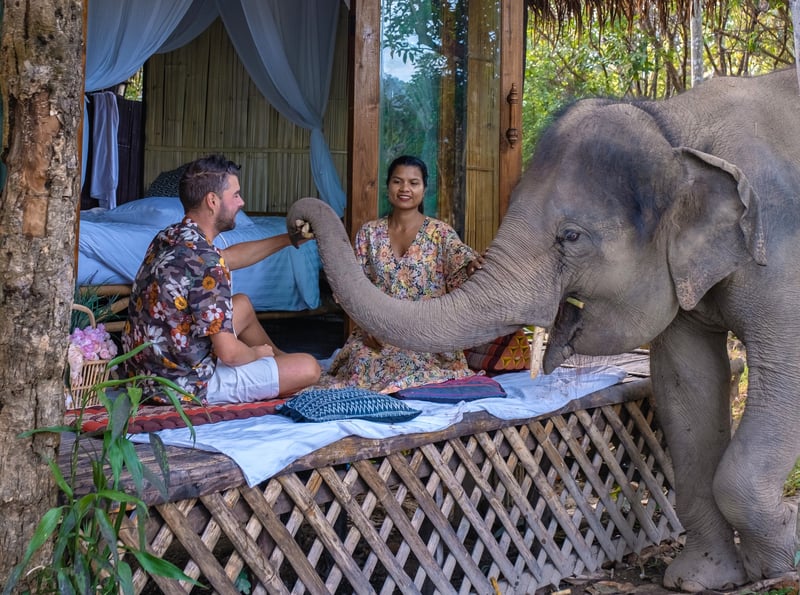
You may have seen the term a lot recently while scrolling through posts from your favorite travel bloggers...'experiential travel'.
While on the outside it may seem like a new trend in the travel and tourism industry, experiential travel (a.k.a. "experiential tourism", "immersive tourism" or "immersion travel") has been around for quite a while, but is just recently gaining traction as a buzzword used by tourism industry stakeholders, travel marketers and social media influencers. Put simply, it's a style of exploration that goes beyond simply visiting a destination; it's about immersing yourself in the culture , connecting with locals, giving back and, ultimately, creating meaningful memories.
In this post, we'll dive into what the experiential tourism industry is all about and explore why it has become one of the fastest-growing (and most exciting) travel trends while impacting the travel industry in a major way.
So pack your bags and prepare to unlock unforgettable journeys that will transform how you see the world!
Authentic Connections: Experiencing Local Cultures
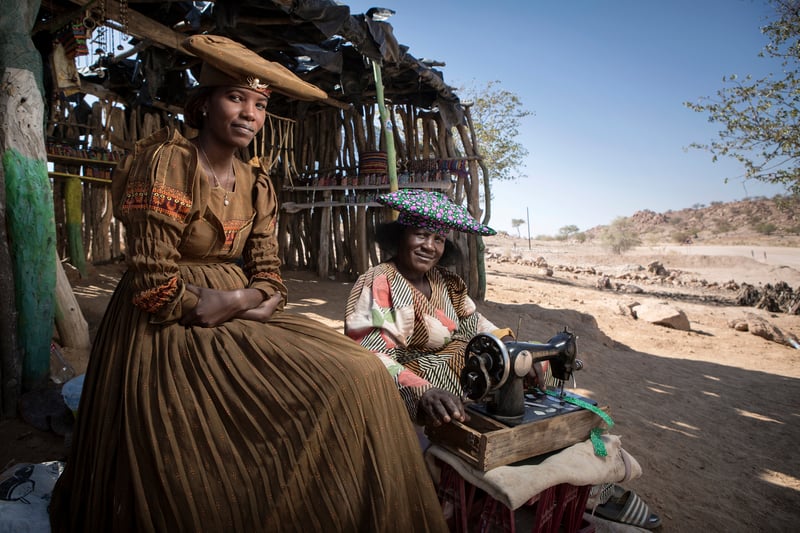
Experiential tourism is all about forming authentic connections with the communities and culture. It encourages travelers to go off the tourist trail and engage with locals, even when visiting mainstream tourist destinations, to experience other aspects of a particular location. Many travelers find that a good way to do this is to participate in cultural activities to gain a ‘slice-of-life’ view of an area's local culture.
A few other ways to engage in authentic local experiences are:
- Learning traditional crafts
- Joining festivals and other traditional activities
- Trying local cuisine or sharing a meal with a local family
- Shopping at local markets
The goal is to gain a deeper understanding and appreciation of the culture for a truly authentic experience that you can’t get anywhere else in the world.
I mmersion in Nature: Embracing the Great Outdoors
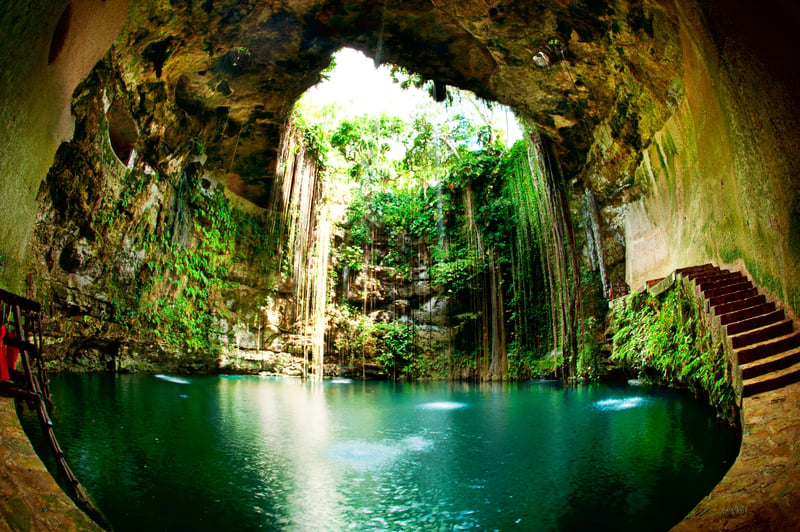
Experiential tourism often takes you off the beaten path beyond the city streets of mainstream tourist destinations and into the heart of nature. It's about embracing the great outdoors, whether trekking through lush forests, camping under the stars or snorkeling in crystal-clear waters.
Many studies suggest that people who stay connected with nature are generally happier and feel their lives are worthwhile, and thus immersion travel can be excellent for your mental health. Stepping away from your phone, emails and social media and reconnecting with nature does amazing things for your well-being, which is why digital detox retreats have become huge in the health and wellness sector of the tourism industry.
You don't even have to go far afield to get this particular benefit of experiential tourism-- you can do your own “digital disconnect” simply by going somewhere completely remote or taking a walk in a national park, to take the time to immerse yourself in nature. You'll witness true beauty, develop a greater appreciation for preservation and sustainability , and very likely feel some wonderfully positive effects on your mental and emotional well-being.
Activity and Adventure: Pushing Your Boundaries
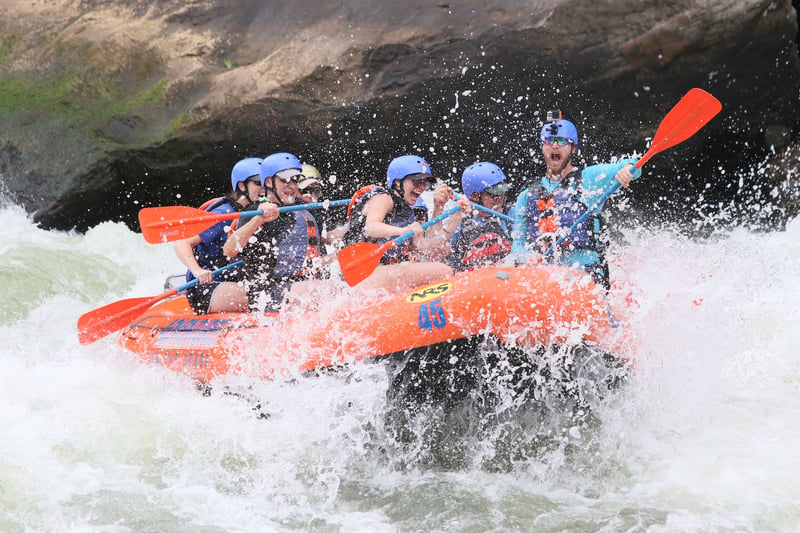
Experiential travel also thrives on adventure travel, or activity based travel experiences that push your boundaries. It encourages you to step outside your comfort zone and try new activities that challenge and excite you.
The possibilities for adrenaline-pumping experiences are endless, including…
- Hiking to remote mountain peaks
- Zip-lining through dense forests
- Learning to surf on pristine beaches
- Bungee jumping
- Swinging through a canyon
- White water rafting
…to name just a few!
For inspiration, check out the adventure sports capitals of the world , full of tour operators specializing in extreme activities. Besides being visually breathtaking destinations, you will find various adventure travel activities that are guaranteed to get your heartbeat up and your adrenaline pumping. It's a natural high (especially when combined with nature) that produces extraordinary, memorable experiences.
Culinary Exploration: Savoring Local Flavors
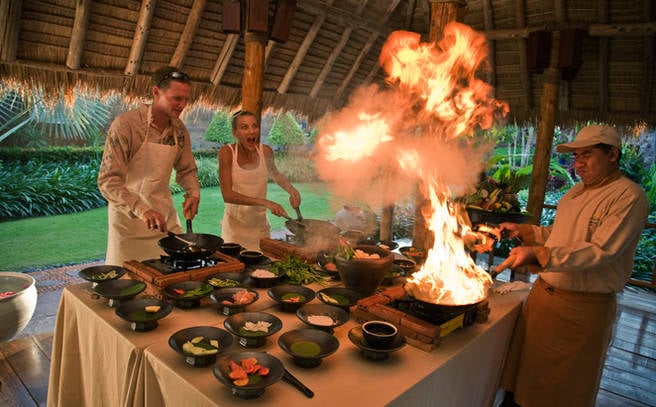
Foodies, rejoice!
Food plays a vital role in experiential travel. Culinary tourism is not only about visiting the culinary capitals of the world , it's about savoring and exploring the local flavors of any destination you visit. Whether attending a cooking class, navigating through vibrant food markets, or dining at local eateries recommended by residents, the goal is to engage your taste buds and experience the local gastronomy firsthand.
The slow food movement has gained traction along with experiential tourism. Here, experiential travelers take their time to learn about the local food culture, the ingredients and the cooking methods used. It's an excellent immersive experience and a great way to learn about the local people and their culture.
Here are a few ways you can practice slow food tourism:
- Take local cooking classes for traditional dishes
- Take guided tours such as street foods
- Ask your local guide questions about food traditions
- Shop at local markets and ask about cooking the produce
Meaningful Impact: Giving Back to Local Communities
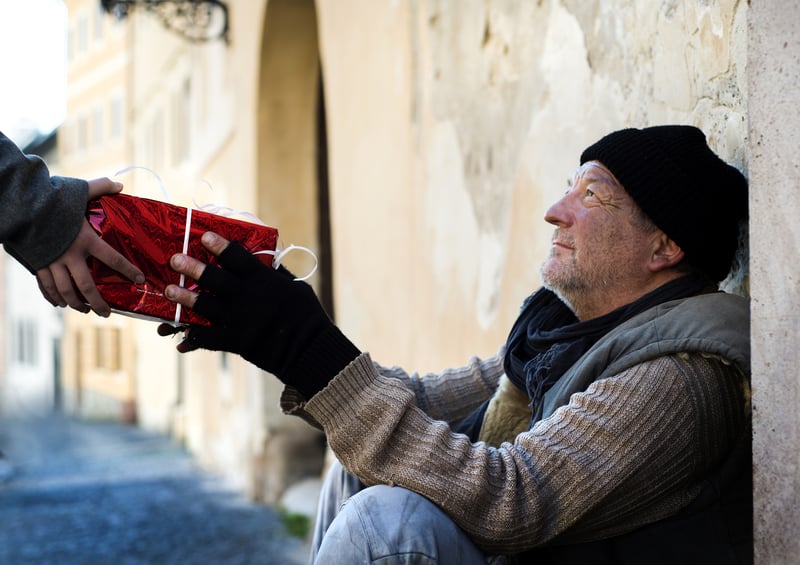
Experiential travel emphasizes making a meaningful impact on the communities you visit. It involves responsible tourism practices, supporting local businesses, and engaging in sustainable initiatives. Whether volunteering with a local organization, participating in community projects, or choosing eco-friendly accommodations, the goal is to leave a positive footprint and contribute to the destinations you explore.
Supporting local businesses is one of the most effective ways to achieve positive economic outcomes for the community. By meaningfully engaging with local businesses of a particular place, you are also creating more authentic experiences to aid your immersive travel.
When you volunteer at a destination, your help enables a meaningful engagement and emotional connection to the place and people where you are creating a win-win situation between yourself and the different cultures you visit.
Experiential Travel Packages
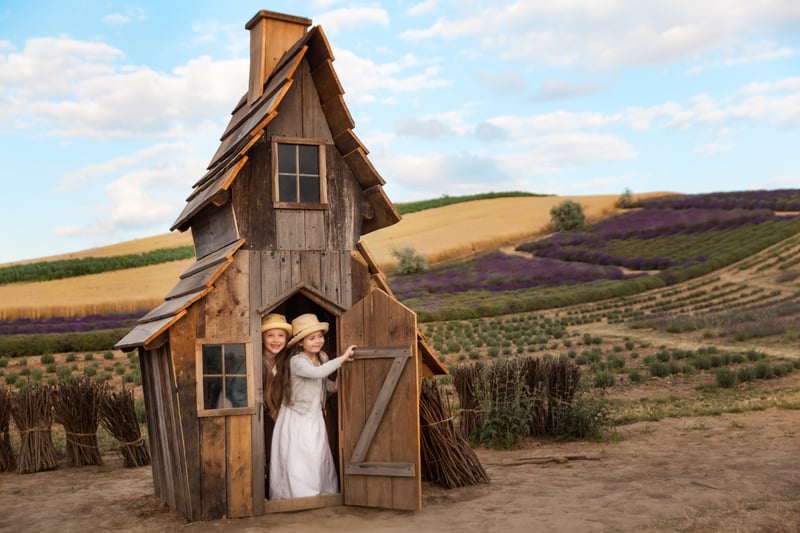
Designed with the passionate globetrotter in mind, packages targeted toward travelers who desire immersive experiences are all about embracing the heart and soul of each destination. Some experiential travel agencies carefully curate a selection of extraordinary experiences themed around the immersive experience.
An experiential travel business could organize itineraries revolving around:
- Historic architecture
- Mapping out history through travel
- Art around the world
Experiential Luxury Travel
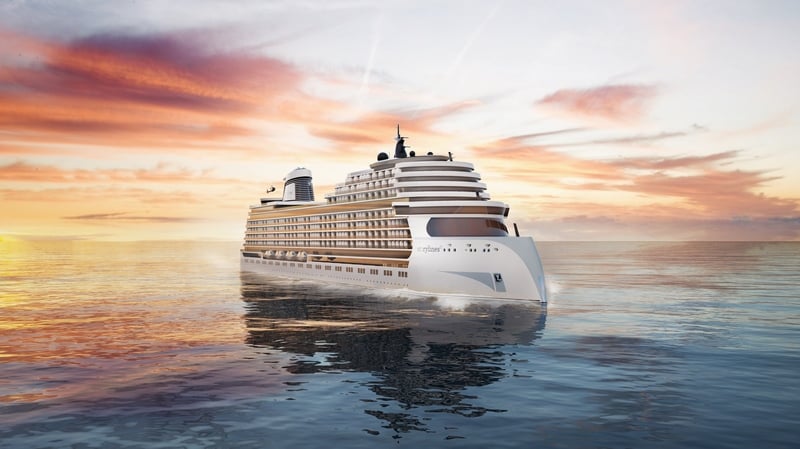
Experiential travel has also taken the luxury travel industry by storm, and for good reason. It offers a transformative way of exploring the world, immersing yourself in the local culture, and creating unforgettable memories.
To us here at Storylines, that's the true definition of luxury. With itineraries that are curated around experiential tourism opportunities, we seek meaningful local connections and making an impact, and having more adventures than you ever thought possible. Our community embraces experiential travel not as a trend, but as a global lifestyle.
If that sounds like you, we invite you to learn more about MV Narrative, a luxury residential cruise ship circumnavigating the globe to discover how you too can use experiential travel as a blueprint for the life of your dreams.
About Storylines
Storylines is a luxury lifestyle ship with a community of like-minded travelers living aboard and exploring the world. We seek transformative experiences, cultural enrichment and community participation, all while surrounded by 5-star amenities and a spirit of adventure. To learn more about how to join our globetrotting community, dive in here .
Topics: Experience , Travel the World
Join the Storylines Community
Recent posts, posts by tag.
- Experience (63)
- Travel the World (41)
- Residents (28)
- General (25)
- Meet Your Neighbors (21)
- Health (17)
- Principles (16)
- All-Inclusive Cruises (15)
- Itinerary (15)
- Vessel (13)
- Sustainability (12)
- Early Retirement (10)
- Corporate responsibility (9)
- Medical (8)
- Working Remotely (8)
- Luxury travel (6)
- Updates (6)
- Construction (5)
- Families (5)
- Solo Travelers (5)
- Sailors (4)
- Advisory (3)
- Pandemic (3)
- wellness (3)
- Entrepreneurs (2)
- Fractional Yachts & Homes (2)
- Wildlife (2)
- Classification (1)
Quick Links
- Career Opportunities
STORYLINES RESIDENTS
- Resident Owner Portal Login
Get in contact
- +1-813-567-8679
- Upcoming Events
Have a Question?
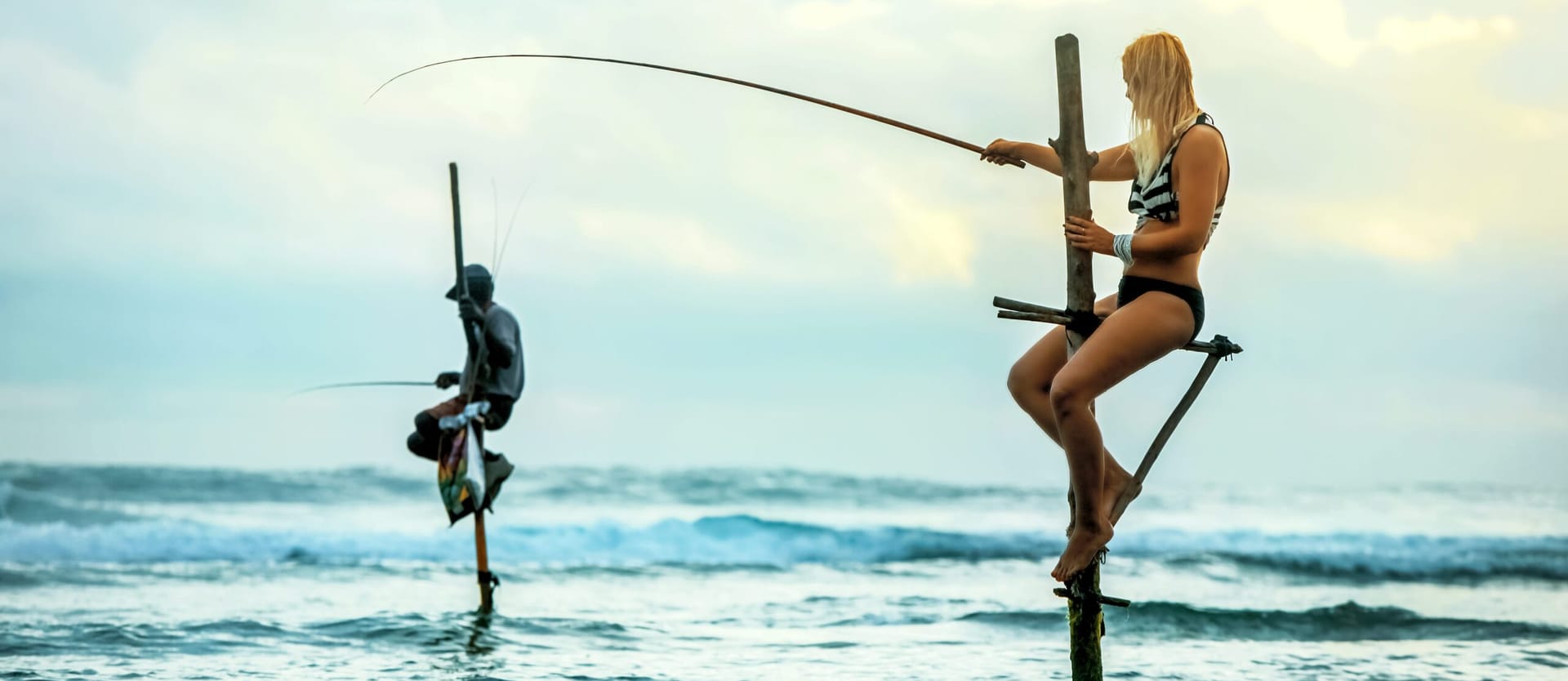
Experiential Travel Explained: Players, Distribution Landscape, and Opportunities
- 12 min read
- Business , Travel
- 14 Jul, 2022
- No comments Share
Reality must be experienced.
In the last few years (and especially after the pandemic), travel trends have dramatically shifted and multiple studies prove it. For example, TripAdvisor's Travel in 2022 Report discovered that about three-quarters of travelers are willing to see new places with priorities such as having new experiences and learning about history and culture not far behind.

TripAdvisor‘s “Travel in 2022: A Look Ahead” Report
Nine out of ten Razorfish study respondents believe the most important keepsake from a trip is a story to tell about it, while 79 percent say that traveling isn’t about getting to a new place, it’s about how you grow as a result of the journey. Moreover, half of Gen Z respondents said they want to get out of their comfort zone and crave a sense of risk and excitement while traveling. Expedia even gave it a name. They called 2022 the year of GOAT – Greatest of All Trips – mindset. Their research shows that 40 percent of travelers dream about trying new food, 31 percent crave for local delicacies, and 23 percent look for off-the-beaten track experiences and destinations. Summing up, we can say that today’s travelers no longer want to spend their vacation hopping on and off the sightseeing bus on the packaged group tour or chilling lazily next to the pool with a cocktail at the all-inclusive hotel without ever leaving the premises (well, we’ll be honest, some still do). Instead of that flight-and-flop style, many vacationers are hungry for excitement, cultural immersion, and new experiences. Obviously, the travel industry has to keep up with customer demand, so today we explore what experiential tourism is about and how travel businesses can capitalize on this surging appetite for exclusivity and adventure.
What is experiential travel?
Experiential travel is a form of tourism that implies an active and meaningful engagement with a destination’s culture, people, and/or environment to create unique, memorable experiences. It’s the story about visiting new destinations, keeping off the beaten path, encountering authentic local experiences, and just doing something extraordinary. And we not only mean actual activities here. Sometimes even staying in an unusual lodging such as a glamping cabin or a treehouse can be an experience of a lifetime. Experiential travel is often confused with immersive and adventure travel (actually, Adventure Trade Travel Association or ATTA suggests adventure tourism as the main unifying term).
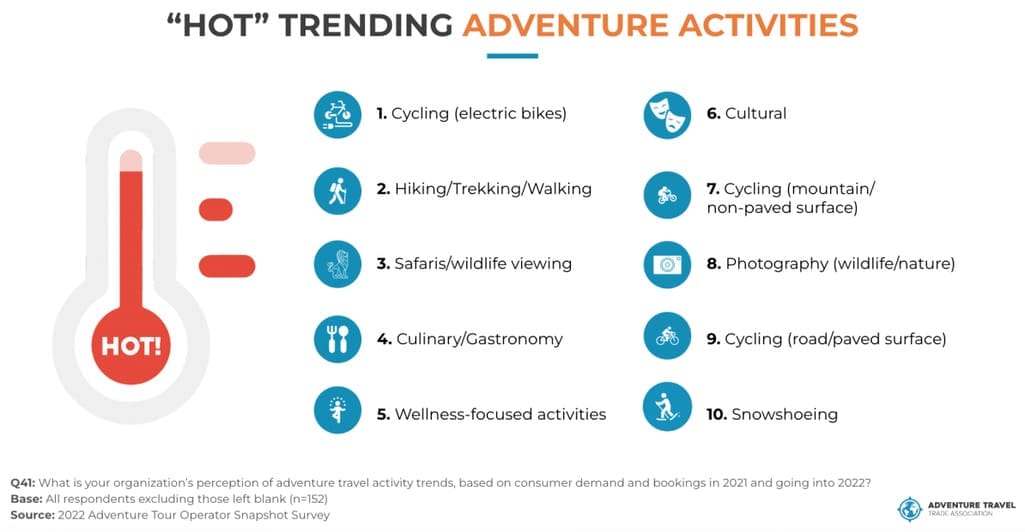
2022 ADVENTURE TRAVEL INDUSTRY SNAPSHOT by ATTA
However, we believe these concepts aren’t interchangeable. In fact, experiential travel can be seen as an umbrella for the other two. Here’s why. Immersive travel implies, well, immersing in the foreign culture which in most cases means mingling with the community at the place of destination, engaging in traditional activities, attending local events, and so on. It can be anything from booking a homestay instead of a hotel to volunteering at the nearby field to attending a weekend flea market or a local yoga class – you get the idea. Meanwhile, adventure travel is more about physical activities. It can be something safe (for the most part) and moderately active like camping or hiking – or more on a sports and even adrenaline-rush side, like skydiving, rafting, bungee jumping, mountain climbing, and so on.
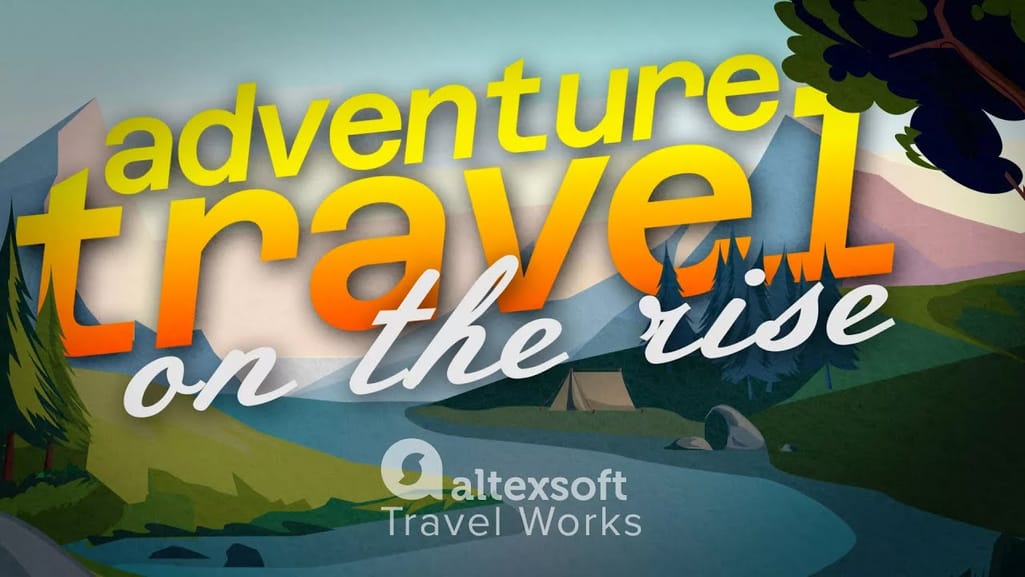
Watch our beautiful video about the post-pandemic surge of adventure travel
So, as you can see, both of these groups are about getting vivid experiences, with the first one involving deep connection with the locals and getting to know the local culture, and the second one (that can even be done alone and in one’s own country) involving an active outdoor pastime. Now that we’re done with the basics, let’s talk about how businesses can actually help adventure-seeking travelers plan and organize the vacation of their dreams.
Experiential travel ecosystem: business models, distribution, technologies, and representatives
If you run or plan to launch a travel business and want to capitalize on the experiential tourism trend, here are options on how to fit in.
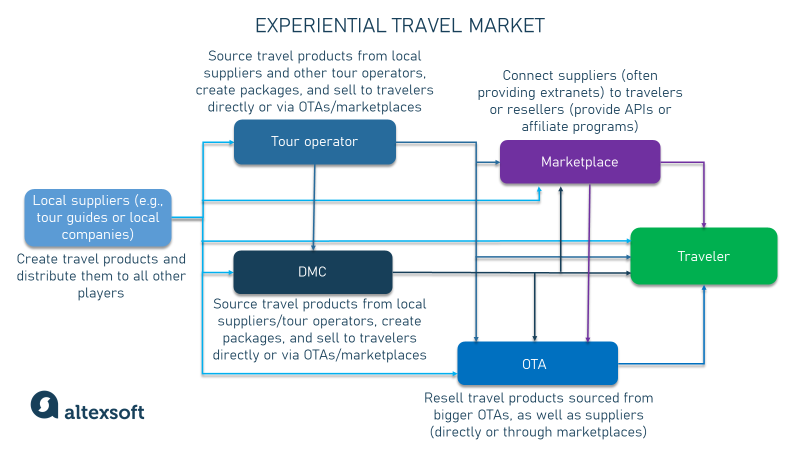
Experiential travel distribution
Local service suppliers: building the base of the pyramid
Local suppliers are the ones that create the initial travel products. As we said, experiential travel is tightly connected to either traditional, authentic practices that only locals can demonstrate or unique, out-of-the-mainstream services provided by specialized, niche businesses. Real-world examples. Basically, any entity that offers the tours and attractions (T&A) services can be placed in this category, be it an amusement park, a Bedouin renting out a camel, a ski resort, or a Chinese farmer demonstrating his rice field. Some of them can be called tour operators if what they do is showing tourists around or arranging guided tours of any kind (pub crawls, coffee tastings, mountain trekking – you name it). Inventory sourcing and distribution. Local suppliers don’t have to source inventory, but they distribute it to all other players including the end consumer. Technologies. Typically, small companies are poorly digitized or not digitized at all, so they manage their operations with spreadsheets and often use distributors’ extranets to create entries and update availability manually. Bigger businesses can adopt itinerary building software (e.g., TripCreator ), a channel manager (e.g., TripAdmit ), or even a focused, multi-featured tour operator platform (e.g., TrekkSoft ) that can assist with scheduling, multi-channel distribution, partner relationships, analytics, and so on.
Tour operators: providing turn-key services
Tour operators are travel companies that devise itineraries, create corresponding multi-component tour packages, sell them to travel agents or travelers, and make sure everything goes well from the start to the end of the trip, having full responsibility to the traveler. Most tour operators have something to offer to adventure lovers. Whether organized by the company itself or sourced from third-party suppliers, such experiential travel products find their place in the overall portfolio. Real-world examples. Tour operators are in a big category that includes a variety of businesses. There are large, well-known companies (like TUI or Jet2holidays ) that even operate their own airlines or hotel chains, so that they not only source inventory from external travel suppliers, but use their own as well. Also, there are niche tour operators that only focus on experiential travel (e.g., Intrepid Travel , Exodus , or Adventure.Travel ) or the ones that specialize on unique, tailor-made luxury tours crafted from scratch for every traveler (e.g., Abercrombie & Kent , Scott Dunn , Black Tomato , ETG , etc.). Besides, as we said, small local companies that sell just one or several local products like a guided tour, safari, cooking classes, or other local activities, join in as well.
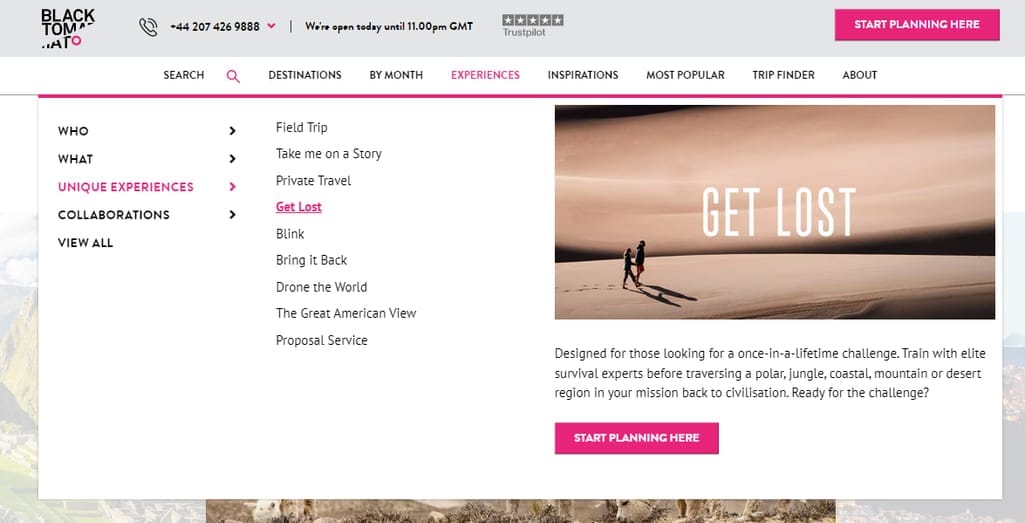
Black Tomato’s Unique Experiences category
Inventory sourcing and distribution. Tour operators source inventory from local suppliers or create their own travel offerings. They distribute their products to OTAs, DMCs, or other operators, list them on marketplaces, or sell directly to travelers (in the office or via website). Technologies. Here, again, it all depends on the size and resources of the company. Small operators manage with spreadsheets, emails, and phone calls, while big players implement a full-blown, specialized system or even develop a custom solution to cover all the operational needs. Mid-sized operators often adopt standalone modules to streamline one or several business aspects such as
- itinerary creation and scheduling (tour builders),
- online booking ( booking engines ),
- multi-channel distribution management (channel managers),
- customer relationships (CRM systems),
- content management (CMSs),
- reporting and analytics ( BI tools ), and so on.
In addition, to facilitate and automate the B2B interaction, bigger companies often develop a suite of APIs to enable integration and share product details with their partners. In case you’re not familiar with the concept, watch our explainer on APIs in travel.

Connectivity in the travel industry
Destination management companies: contracting local experiences
Destination management companies or DMCs are similar to tour operators in a sense that they also organize the travel itinerary, create packages, and usually work with multiple suppliers to make all the necessary arrangements. However, since DMCs usually operate from the said destination, they have a deeper knowledge of its specifics, regional potential, and local suppliers. They offer a wider scope of services, including airport transfers, vehicle rentals and other types of logistics support, hotel and restaurant bookings, tailored activities and workshops, themed corporate events, and much more. Having extensive knowledge of the destination’s touristic resources, DMCs can offer the most unusual experiences to those who want to stay off the beaten path and try something new and authentic. Real-world examples. There are global DMCs like JTB Group that operates 508 offices within 143 cities worldwide and local ones that specialize in just one region or country like SAT Mexico DMC . Inventory sourcing and distribution. To source inventory, DMCs work with tour operators and direct travel product suppliers big and small. They sometimes act as hotel wholesalers ( bed banks ), contracting allotments from local accommodation providers. Then they bundle inventory into packages and, just like tour operators, sell directly to the customers, partner with distributors, or work through marketplaces. Technologies. Since the line between tour operators and DMCs is very blurry and their operational models are so similar, the list of software that can come in handy is the same. Though some vendors have solutions tailored specifically to the needs of DMCs (e.g., eTOS ).
Focused T&A marketplaces: aggregating offerings for every taste
Tours and attractions (T&A) marketplaces do not create, conduct, or buy tours for reselling. They only connect suppliers with consumers and distributors and earn their commission if the tour is booked. Here’s how it works. Tour operators list their products on the marketplace platform, increasing their customer reach. The marketplaces often offer expert coaching to their suppliers (e.g., on marketing or technology), as well as payment processing services and analytics tools. On the other side, travel agents (or other resellers like travel bloggers) partner with marketplaces to earn commissions on the bookings made through affiliate links/widgets located on their own websites, social media, blogs, or other digital platforms. Typically, they also can enjoy the support team’s patronage and access to useful tips, analytics, and other handy perks that depend on the platform.

Check our video about how T&A marketplaces emerged and evolved
Real-world examples. Viator , owned by TripAdvisor, is the largest T&A marketplace. When searching for a destination, travelers can see different categories of activities, with Eco Tours, Nature and Wildlife Tours, and Outdoor Activities being some of the options.

Viator’s activity categories
GetYourGuide , one of Viator's main competitors, also has a Nature and Adventure category for active travelers. Those who prefer other experiences like cultural immersion will have to browse through alternative activity types like Workshops and classes, Other experiences, or Guided tours. Inventory sourcing and distribution. T&A marketplaces usually work with direct suppliers and tour operators/DMCs, offering extranet interfaces to manage listings. Inventory is either sold directly to travelers or through resellers like OTAs and affiliate partners. As we said, travel bloggers or eCommerce sites can place affiliate links, banners, or widgets on their platforms and earn commissions on bookings. Big marketplaces support a more complex integration and offer a set of APIs that allow distributors to connect and source all product information automatically. Then, depending on the partnership mode, resellers can either enable booking via their own platform or redirect to the marketplace for reservation and payment processing. Technologies. There are specialized marketplace builders (like Sharetribe ) that help develop such platforms. Their features include powerful search capabilities, transaction and content management, a booking engine, extranet for suppliers, communication channels, plus a set of business and pricing rules to handle different types of workflows. But of course, big players build their own custom solutions from scratch.
Travel agencies: complementing portfolio with T&A
When we say travel agencies, in most cases we mean online travel agencies or OTAs. Those are websites that sell all sorts of travel products, separately or packaged in bundles. Real-world examples. If you look at the biggest players like Booking.com , Expedia , or Airbnb , you’ll see that all of them have a T&A section of some kind with subcategories that help filter propositions at a specific destination. This way, OTAs cater to those travelers who do the research and planning themselves and want to find out what they can experience during the trip.
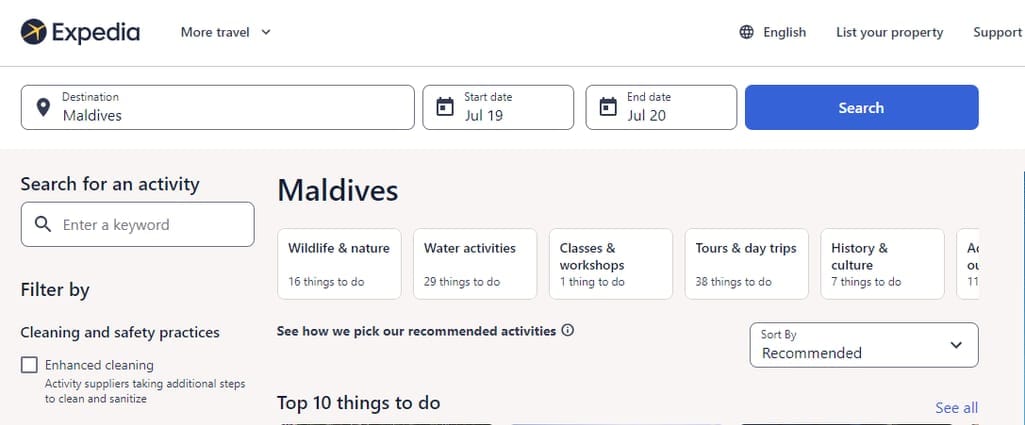
Expedia T&A offerings
Inventory sourcing and distribution. Basically, an OTA business model is similar to that of a marketplace, but the range of products they deal with is much wider. They are the main retailers in the travel market and their inventory comes from all possible sources: direct suppliers, wholesalers, marketplaces, or bigger OTAs. Then it’s resold on a markup or commission basis via their own websites. Technologies. Well-digitized OTAs have three main tech components:
- the front side which is their website or traveler app;
- the back side where the booking engine, databases, accounting, and other internal systems function; and
- the provider side which regulates connections to suppliers.
Consider reading our article about an OTA’s back office to learn about their tech infrastructure in detail or watch a short video explainer by our travel expert.

Back office in OTAs explained
Travel app developers: suggesting a focused solution
Travel apps provide a distinct way of assisting independent travelers. Today, the world functions on smartphones; so, if you do it right, your product will definitely find its fans (be sure to check our tips on how to make a smashing T&A mobile app ). Such apps typically do not sell anything, but they help with the search, provide information, and redirect to the provider page for booking (if relevant). So, to get your potential customers the information they want, you’ll have to connect to data providers and experts in the area, depending on what you want to focus on. For example, any navigation app would need mapping data, so you’ll probably have to connect to, say, Google Maps or OSM , while if you want to add reviews to places you highlight, look at Yelp as a source. For inspiration, check out some of the popular apps.
- AllTrails is a beautiful navigation app for hikers, runners, or bikers.
- Couchsurfing is a well-known platform to request homestays and interact with locals all over the world.
- Campspot helps find and book campgrounds.
- Workaway , Woldpackers , or WWOOF connect those who need assistance with volunteers who are willing to help (and get to know the culture from inside).
- eBird introduces you to the world of birding and our feathered friends, and so on.
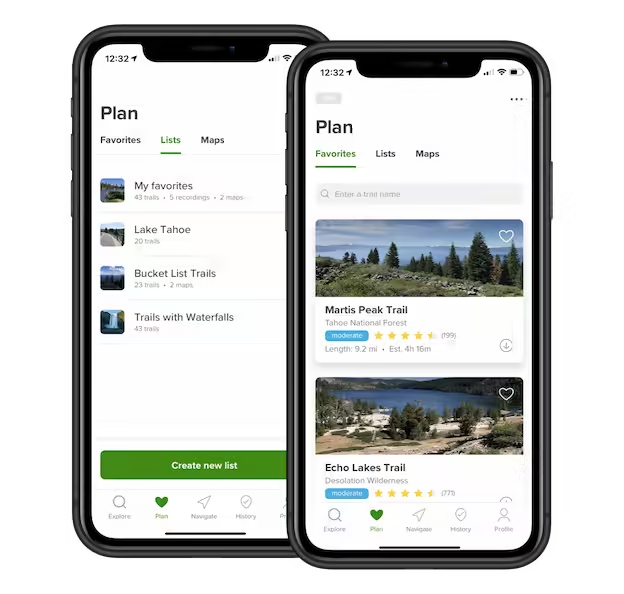
the AllTrails app Planning feature
Besides such focused platforms, there are a lot of travel guides and assistants that help you find interesting places and unusual activities wherever you go (though more often than not, these are the apps developed by OTAs or marketplaces), e.g., Like a Local , Yelp , Atlas Obscura , etc. If you want to develop your own app, the sky's the limit regarding ideas. Maybe you’ll fashion a platform for treasure hunters, or a brand new travelers social network with an AI-powered speech translator to facilitate communication, or maybe collect information about all the cooking classes or Buddhist retreats in the world – who knows?
What to consider when starting an experiential travel business
Whether you already have a travel business and want to supplement your portfolio with experiential tourism offerings or are thinking about entering the market, we have a few tips for you to keep in mind.

Inventory management and integrations
If you plan to source travel products from third-party suppliers, carefully compare their terms, conditions, pricing models, services, and integration options. Connecting via APIs is always a great way to avoid manual mistakes and have the most up-to-date information. However, be aware that your most authentic products might come from local suppliers who are the least digitized.
Distribution
Balancing your distribution channels and finding an optimal mix is of the same importance as choosing suppliers. Partner with resellers and advertise on marketplaces; create a network of affiliates and cooperate with in-destination merchants like tourist information deals and hotels; consider adopting a channel manager and a point-of-sale software to sync availability and boost personal sales. However, if you want to create a high-end brand image, you’ll have to be more selective and use carefully chosen channels to create exclusive offers for your target customer group.
Your advertising and promotional strategy can be a real gamechanger. Research the market to find your target customers, where to reach them, and ways to attract them. Work on SEO, connect to customers on social media, promote your company on review and local information websites. Visit our separate posts on marketing and personalization in travel to learn more on how to draw people’s attention.
Online and mobile presence
Creating a robust website with an intuitive user flow and an easy-to-use mobile app is a must in today’s digital world. Remember about localization aspects, consider offering inbuilt communication channels like chatbots , and be careful when choosing a payment gateway provider (if you enable booking).
Sustainability strategy
Today, experiential travel and sustainable , or green travel are among the top trends (alongside concern about health and safety procedures and demand for contactless experience). And as studies show, they not only coexist but also correlate as most adventure-seeking travelers are also concerned about environmental and climate issues.
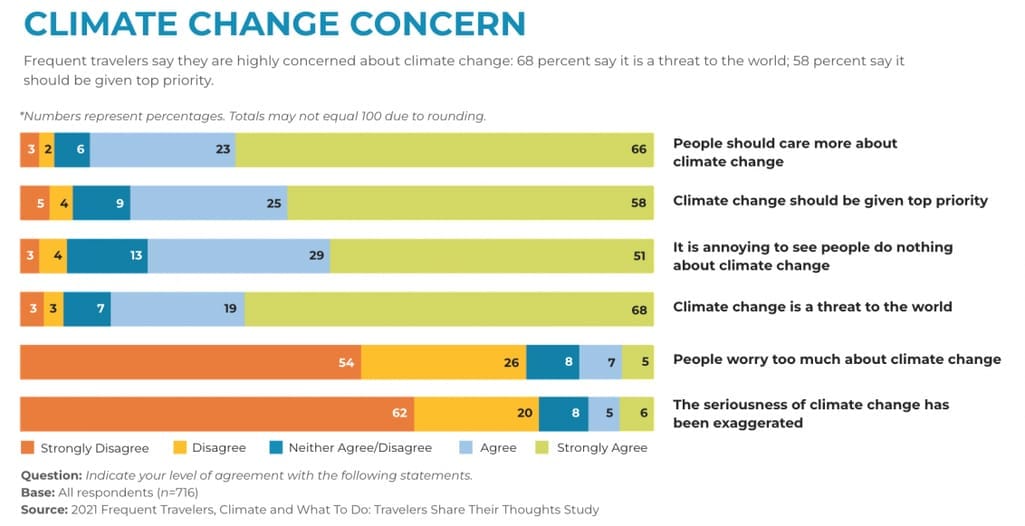
FREQUENT TRAVELERS, CLIMATE AND WHAT TO DO: TRAVELERS SHARE THEIR THOUGHTS study by ATTA
Experiential travel benefits local communities . Another reason these two trends are closely interconnected is that experiential travel heavily engages local communities in touristic activities. That brings along direct social benefits – from immediate income generation to overall infrastructure development – which is one of the main aspects of sustainable travel. Besides, getting to know the local culture helps increase awareness and preserve the traditions and authenticity of the destination community. A 2022 Booking.com Sustainable Travel Report reveals that sustainability is important to 81 percent of travelers. The same report shows that 66 percent want to have authentic experiences that are representative of the local culture away from popular tourist attractions with 45 percent believing that protecting and learning about local cultures is part of sustainable travel. Sadly though, around 40 percent of respondents indicated that they don't know how or where to find activities or tours that ensure they are actually having a positive impact and giving back to the local community. Adventure travel is an alternative to high-emission flights . In addition to that, environment-friendly adventure travel offers a great alternative to taking distant flights or bus tours that generate harmful emissions, so the increased share of such kinds of tourism can also help reduce the negative impact of the travel industry. What can travel companies do? Being aware about the importance of green initiatives for adventure-seeking travelers, what can you as a travel company do to be in line with today’s trends? Here are some ideas.
- Get certification -- some industry-recognized certifications that verify high social and environmental performance, compliance with standards, and commitment to sustainable business practices are Travelife , GSTC , or B Corp .
- Offset emissions -- carbon offsetting compensates for your harmful impact by investing in emission reduction projects such as reforestation, biofuel usage, and so on.
- Adjust itineraries and travel products -- by choosing more environment-friendly accommodation options, transportation, and suppliers.
- Fundraise for communities at your destinations.
- Finance research.
- Educate your partners and customers to work and travel responsibly.
Also remember to not only commit and contribute to social, economic, and environmental improvement, but also promote your efforts and showcase results – to attract like-minded travelers.
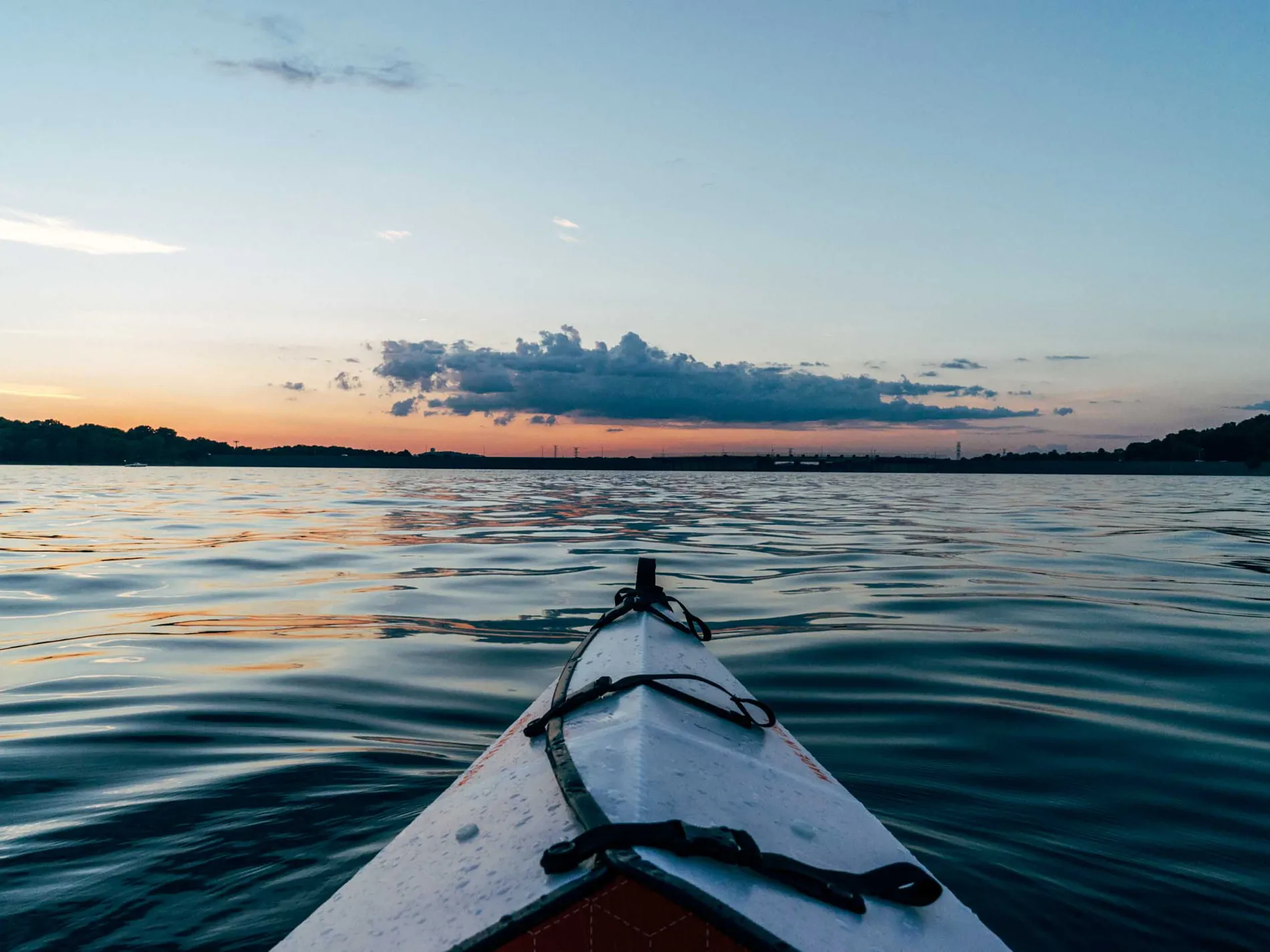
The rise of experiential travel
As tourism outpaces other industries—forecasted to grow 3.7% in the face of other economies this year—it’s experienced a revitalization. Experiential, adventure, responsible, and green travel are reinventing the way communities, ecosystems, economies, and brands interact. We examined these trends closer and how they’re being embraced by travel brands.

In a recent report , Trend Watching discusses a new type of consumerism: one with a more sustainable and ethical focus. As general consumers demand that businesses become more accountable for leading solutions to social problems, tourism brands are taking action, building a social mission into their operations and changing consumer mindsets across other industries.
As a result, experiential travel—an evolution of adventurous and active travel through the immersion of local culture—is on the rise, connecting travelers with locals and reinforcing a feeling of self-fulfillment as a global citizen.
A recent Experiential Traveler report from Skift and Peak Adventure Travel Group articulates the direct relationship between globalization and the ubiquitous technology that has “led to the homogenization of cities,” according to Jamie Wong, founder/CEO of Vayable , resulting in “travelers craving locally made and authentic experiences.” Just look at the Instagram effect as proof: it’s accelerated the shift from traditional mass travel to more personalized experience. With minimal research, users can discover where their friends have visited, how they traveled, and the micro-moments they experienced while they were there.

Here, we look at the three biggest and fastest-growing subcategories of experiential travel—eco travel, responsible travel, and adventure travel—and identified three destinations that have benefitted from these segments.
Eco-Friendly Travel
Traveling with a purpose is in many travelers’ mouths, and no longer are the hospitality and ecotourism industries mutually exclusive. This year alone, the ecotourism market accounts for 6% of the world’s GDP with a yearly growth rate of 5%. Whether travelers opt for charitable holidays or greener travels, globetrotters seem to give a great thought to how they can help the community or reduce their environmental footprint in the places they visit. Such decisions range from choosing a cleaner mode of transportation or choosing a destination where the community welfare and human rights are respecting international standards.
Tortuguero, Costa Rica
On December 1st, 1948, Costa Rican President José Figueres Ferrer demilitarized the country and redirected its military budget toward health care, education, and environmental protection. The efforts helped preserve about 25% of its land in national parks and biological reserves and enabled Tortuguero to be declared a national park by 1970 to further protect (and repopulate) the nearly extinct green turtle species. In order to preserve its fauna and protect its wildlife, the village is primarily focused on sustainable development in order to preserve the sensitive ecosystem while still welcoming visitors.
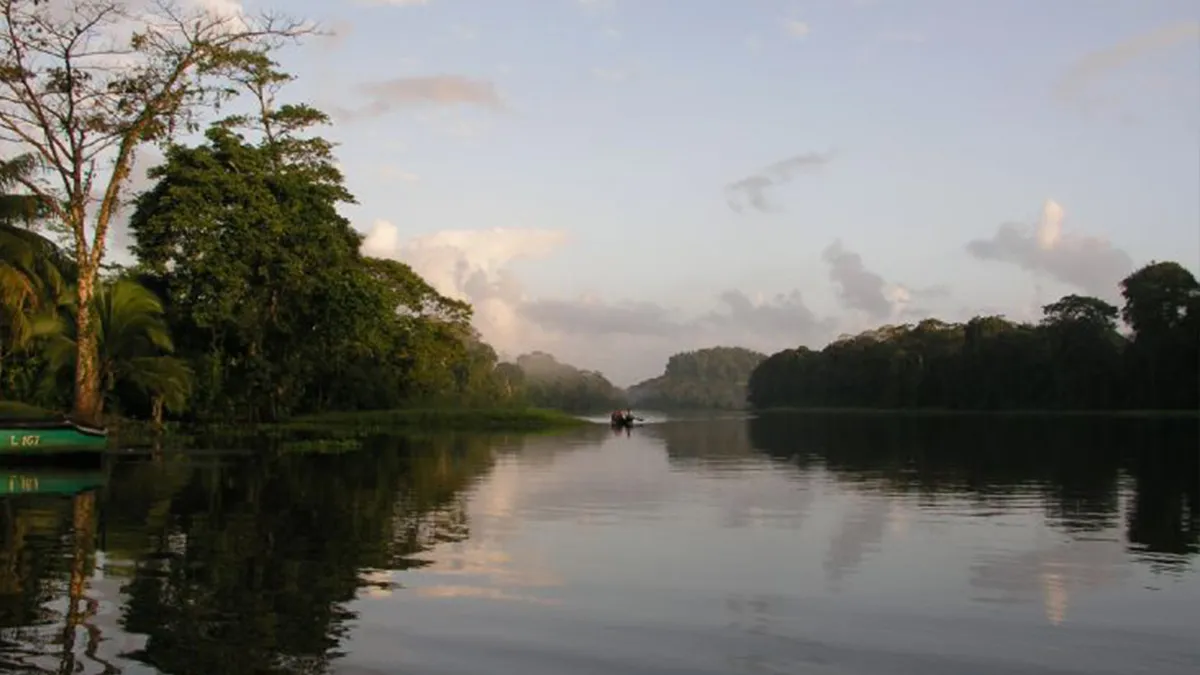
Responsible Travel
Responsible travel includes three pillars of ethical sustainability: environmental, societal and economical aspects. And from remote beaches to sky-high cities, there’s an option for any responsible traveler. Environmental practices are increasingly expected by travelers anymore, but the need for local understanding, respect and support via societal and economical options are creeping up higher in the list of traveler demands. In the last decade, responsible travel has become a trillion-dollar industry, influencing consumers to pick destinations based on economic or political choices. As a result, the purpose of traveling has shifted far beyond personal experiences and has become, instead, an opportunity to flex citizen diplomacy.
Cape Town, South Africa
In 2002, Cape Town issued a Tourism Development Framework in order to create better place for people to live in and better places to visit. At the core of this declaration are six defining pillars that ensure sustainability; water and energy efficiency, waste management, skills development, preferential procurement, social development, and enterprise development. Though it’s a daunting task, this early initiative is an enormous step in the right direction. ‘ The Big Six ,’ as it’s known, aims to foster community-wide personal and professional growth in hopes of reducing—and some day eliminating—poverty in the surrounding areas.
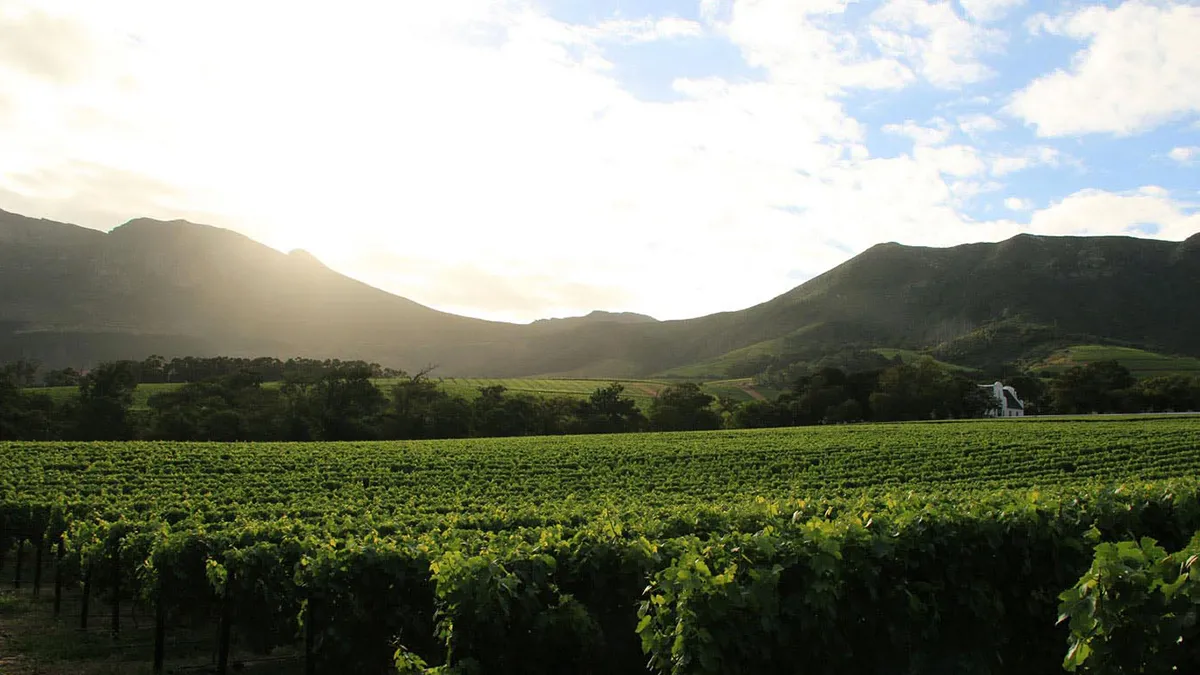
Adventure Travel
The concept of adventure or active travel lacks a clear definition due to its broad range of offerings, but it generally includes activities like interacting with different cultures, undertaking a physical activity or engaging with nature . It can be further divided into hard adventures (like extreme sports) or soft adventures (leisure and education). However you define it, adventure tourism—particularly in rural areas and wilderness environments—is dependent on human and nature capital , with the protection and promotion of these resources crucial to its success.
Being the longest country in the world has its perks. The various climates and geographies that span the length of Chile create a diverse landscape that include high altitude mountains, vast valleys, pristine rivers and lakes, cities embedded in coastlines, deserts and rainforests, and the iconic Patagonia. This diversity lends itself to an equally wide range of sporting activities that relies on the country’s unique terrain. Chile’s arm of adventure tourism promotes hiking, kayaking, mountain biking, sandboarding, surfing, skiing, and wine tasting—and it’s no wonder why the country was awarded “South America's Leading Adventure Tourism Destination” in 2015 and 2016 by World Travel Awards.
5 Ways Travel Brands Can Keep Up With Eco Trends
- Put forward sustainable initiatives. The increase of travelers looking to reduce their environmental footprint is bigger than ever. Communicate any successful green initiatives in which you participated.
- Educate your travelers. Many travelers are not aware of ways to reduce their carbon footprint while traveling. Give them tools on how they can make their trip more environmentally friendly and guide them towards better, more sustainable choices.
- Develop a range of unique local experiences. Be different, but stay local. Travelers want to live personalized, out-of-the-ordinary experiences with a wide variety of activities that reflect local cultures and lifestyles.
- Invest in your website and continuously build content. Depending on how it’s used, technology has the power to disrupt or inspire. Having a clear, easy-to-navigate website is essential to stand out among the crowd, with the most salient brands releasing interesting and consistent daily content to keep their audience involved.
- Connect with users. Encourage your audience to leave reviews, and maintain good communication with them. But don’t neglect negative feedback: good customer service can often outweigh poor experiences. And that kind of transparency has the ability to develop deeper brand loyalty.
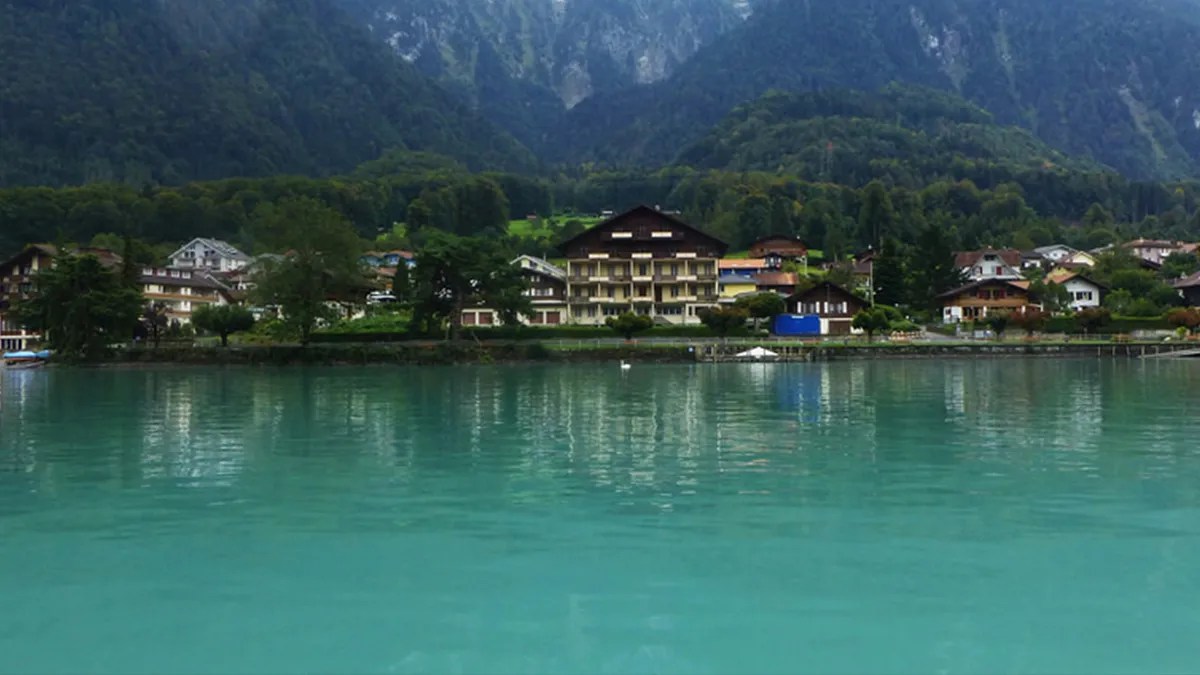
Knowing is better than not knowing. Read more Insights related to trends.

The year of privacy
Read more on: The year of privacy

Women’s sports: a changing landscape for the outdoor industry to take note
Read more on: Women’s sports: a changing landscape for the outdoor industry to take note

Why, how and when to rebrand (2024 edition)
Read more on: Why, how and when to rebrand (2024 edition)
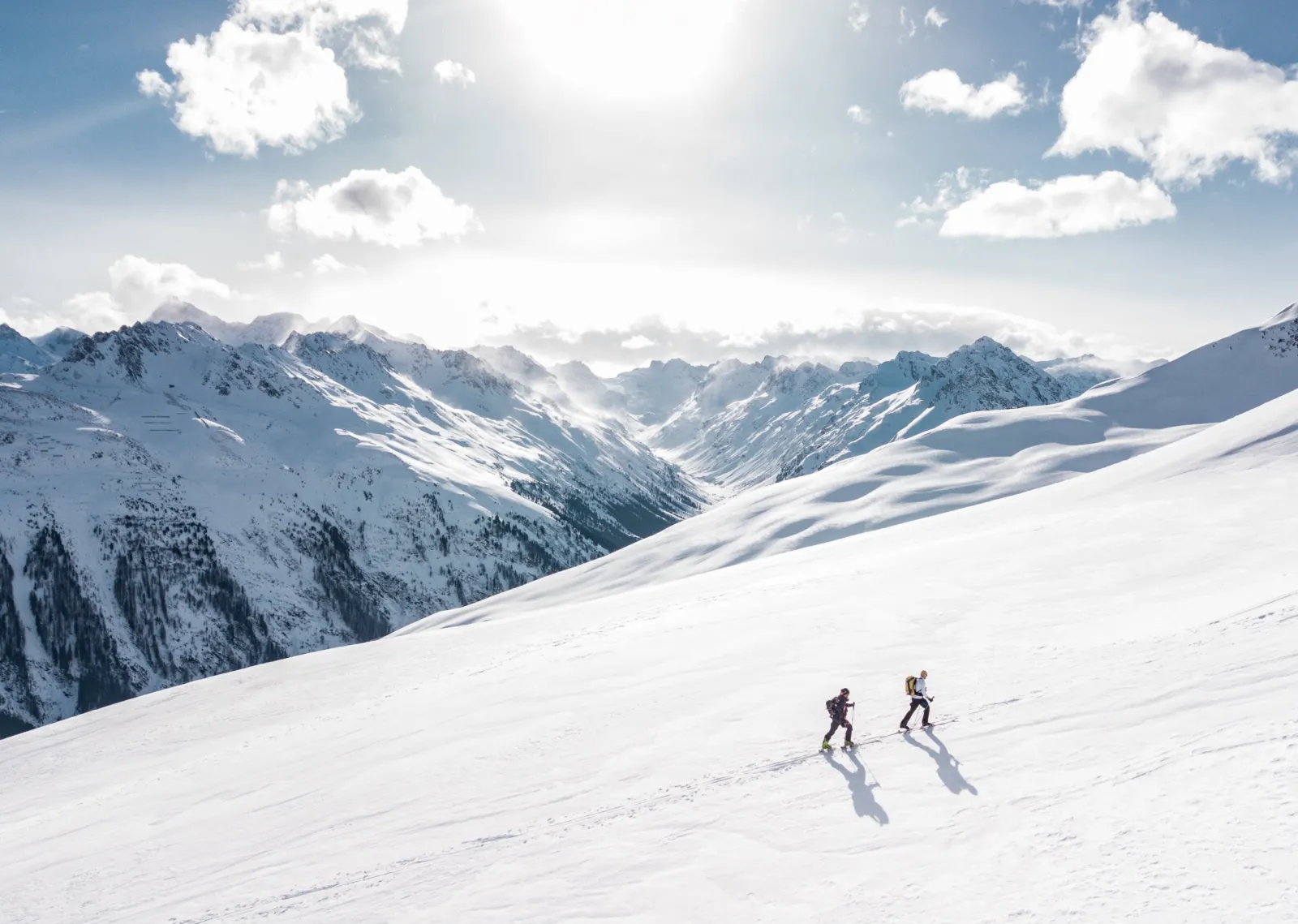
8 totally unscientific outdoor industry predictions for 2024
Read more on: 8 totally unscientific outdoor industry predictions for 2024

How to know if your brand marketing is working
Read more on: How to know if your brand marketing is working
Get Insights on the Outdoors in your inbox
Every month, you'll get research, thinking, trends, and stories from the world of outdoor sports and tourism in one handy email. Sign up today to put the outdoors in your pocket.

Experiential tourism
EXPERIENCE off-peak, low-impact, slow tourism
Emerging trends in tourism.
Experiential tourism is an increasingly influential trend in global tourism. The Covid-19 pandemic has left travellers seeking more immersive experiences which give a sense of adventure , discovery and culture . Experiential tourism aims for a deeper emotional connection for visitors and supports more sustainable and low impact tourism.
Active learning and immersive tourism
Experiential travellers immerse themselves in exploring local culture, heritage, history, art, and food. This is opening new markets and engaging new and diverse tourism providers. Experiences can range from an artisanal butter churning workshop (French) in Brittany to cycling along Neolithic tracks across moorlands on the unexplored West Kernow Way in Cornwall This new consumer-led demand is the inspiration for the EXPERIENCE project which is driving new approaches and offers practical support to a wide range of stakeholders in six pilot regions in the UK and France, providing new ways of doing tourism for other regions.
Economic benefits
The EXPERIENCE project is dedicated to growing significant numbers of low season or off-peak visitors. Revenue generated will be fed back into local economies which help protect and maintain natural and cultural attractions. As well as generating economic prosperity , the project aims to bring benefits to the environment and communities, and to mitigate any impact of increased visitor numbers.
Protecting the environment
Experience aims.
EXPERIENCE will train and support local businesses, organisations and individuals to develop ideas for activities into unique autumn and winter experiences. These will be designed to appeal to visitors between October and March, thereby extending the traditional tourist season and bringing money year-round into the local economies of the project’s six areas across the UK and France.
Check out our latest discounts to book your next family holiday at the best price!
Experiential tourism: our complete record
Tourism is very often associated with a desire to see as much as possible in as little time as possible. This sometimes results in a disappointment, that of not having taken the time to really discover the region visited. In recent years, however, certain types of travel have become much more feasible for travellers seeking an immersive experience. Always seeking to improve the response to the needs of families, Little Guest has taken an interest in this form of tourism that places the five senses and emotion at the heart of the trip: experiential tourism.
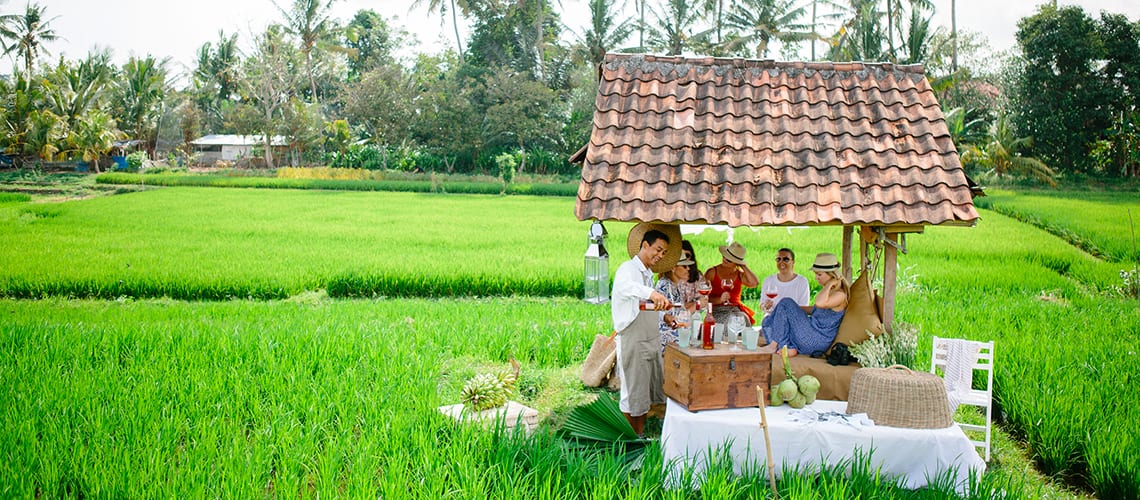
Table of contents:
- Experiential tourism: definition
- Answers to the most frequently asked questions
- Our hotels adapted to experiential tourism
- To go further
1 – EXPERIENTIAL TOURISM: DEFINITION
Experiential tourism (or experiential travel ), a concept born from the fusion of cultural tourism and learning tourism , allows everyone to travel differently. By offering a unique experience to travellers, this form of tourism allows them to discover a region from the inside, immersing themselves completely in the daily life of the local population . The traveller is therefore invited to learn about the customs of the inhabitants, to learn more about the region’s gastronomy or to participate in craft workshops. Experiential tourism revolves around 4 main ideas:
- The acquisition of new knowledge through immersion in the local culture. Get to know the locals, discover the native culture , its crafts and know-how, learn about local dishes, participate in cooking classes , attend regional food festivals, take part in creative workshops organized by local people, etc.
- The stimulation of the senses . Experiential tourism applies to all types of travel, whether urban or rural. For example, you can take part in urban activities , street shows and major events in the cities that host you, but also take the time to contemplate the natural landscapes that surround you and visit the national parks.
- The will to be an actor of your journey . Experiential tourism allows you to refocus on what really interests you. Are you passionate about geology? Take part in a hike organized around this theme! Are you more of an art lover? Sign up for a local pottery course to learn from the people.
- The discovery of new ways of getting around . To stimulate your senses, there’s nothing better than venturing into the unknown. So don’t hesitate to choose new means of transport; rent a small boat , take part in an aerial tour by signing up for a hang gliding session …the possibilities are endless. In addition to opening you up to new sensations, these discoveries will also allow you to discover eco-responsible tourism and its benefits for the planet.
Because it immerses travellers in local culture, experiential tourism shares common points with slow tourism but also with agro-tourism and local tourism. However, it is unique for a simple reason; it places the people encountered, the places visited and the activities practiced at the heart of the travel experience. Unlike a product that can be bought, an experience has to be lived! So rather than buying a souvenir that will gather dust on a shelf, why not create beautiful travel memories ?
2 – ANSWERS TO THE MOST FREQUENTLY ASKED QUESTIONS
Why learn about experiential tourism?
Today, traditional tourism is being shaken by many changes in our way of life. In addition to political instabilities within countries and other security issues, ecological concerns are becoming more and more important in our way of thinking about travel.
Choosing experiential tourism has definite advantages: it can be practiced just a stone’s throw from your home or on the other side of the world, it allows you to discover a local culture, population or know-how , and it offers everyone the opportunity to discover, alone or with the family, what touches us most. If taking part in the exercise is a gamble, the one that there will be more good surprises than bad ones, it allows you to get off the beaten track , take time for yourself and your loved ones and live a unique experience .
Why is this form of tourism ideal for families with children?
It is well known that young children love to discover, play and handle everything they encounter. During adolescence, a time of individual construction and personal development , our dear little ones are open to a lot of new things and discoveries. In fact, to learn more about the benefits of family travel with your children, feel free to take a look at this article !
By offering them the opportunity to participate in an immersive travel experience , you offer them the chance to refine their knowledge of a country or region, to arouse their curiosity and to discover a lot of things. In addition to letting them open up to others, this form of tourism invites them to develop their capacity for dialogue, good manners and tolerance. Last but not least, living a trip full of authenticity and discovery very often creates or consolidates family ties around memories of memorable holidays.
How is this way of travelling good for the planet?
We know today that our planet is in danger. We also know that every gesture, no matter how small, can play an important role in the preservation of our ecosystem . Taking part in a trip that is experiential tourism is a good way to take part in today’s ecological effort.
Because it puts the ideas of « living » and « doing » at the heart of the travel experience, this form of tourism contrasts with traditional tourism, where the tourist is simply a consumer. By taking an interest in local businesses, by promoting the local economy or by exchanging with the indigenous populations, you will contribute to the creation of a form of green tourism in line with eco-responsible ideas. Moreover, thanks to its sensory dimension, experiential tourism gives the traveller a role as an active and involved actor. Aware of the growing willingness of families to travel more responsibly, Little Guest has also looked at slow tourism , another way to discover the beauties of the world while reducing our carbon footprint .
3 – OUR HOTELS ADAPTED TO EXPERIENTIAL TOURISM
Le Domaine des Clos **** in France

The Domaine des Clos , located near Angoulême, is the fruit of decades of work by the couple of owners; years during which they patiently imagined, transformed and restored the buildings of this former wine estate. Surrounded by orchards and vineyards, the Domaine is the ideal base from which to enjoy what the region has to offer: canoeing down under the Gard bridge or hiking in the Alpilles , the choice is yours.
It is therefore particularly suitable for families wishing to try their hand at experiential tourism without going to the end of the world. Children will be able to take advantage of the facilities at their disposal: a huge garden , a large swimming pool , trampoline , table tennis tables and other board games, but also take part in one of the cooking classes provided especially for them. Parents can sign up for a yoga class, participate in a local wine tasting or learn about vegetarian cuisine . After a wellness session at the hotel, why not discover the treasures of the region recommended by the owners: horseback riding in the Camargue countryside , discovering the Nimes Arena, participating in the Avignon theatre festival , among others.
By offering its guests the opportunity to discover the different aspects of local culture and to stay as if they were in a local house, while guaranteeing luxury hotel services , the Domaine des Clos is perfect for discovering this new form of tourism in a gentle way.
Patrick’s Lodge ***** in Senegal

Conceived as a true African palace, in the heart of nature, Patrick’s Lodge , located between Dakar and Palmarin, is perfect for travelling families in search of a change of scenery, cultural discoveries and sublime landscapes. Furnished with modern, locally inspired pieces of furniture , the estate’s houses and suites blend into the surrounding nature. Colourful coatings, raw materials, decorative elements produced on site with respect for local craftsmanship , the hotel itself is a reflection of experiential tourism : local, artisanal and authentic , while offering top-of-the-range services.
Land of traditions par excellence, Senegal has a lot to offer tourists. Accompanied by passionate and exciting guides, set off to discover the Sine Saloum salt marshes or share a meal with an inhabitant of the village of Djilor , before dancing with your toddlers to the rhythm of the tam-tams. Don’t forget to visit the traditional market held every Wednesday, take to the sea in a pirogue to visit the neighbouring islands, or let the engines of the property’s quads roar to discover the surrounding nature . Finally, visit the Bandia nature reserve to improve your knowledge of the region’s wildlife or book a sea trip with a local fisherman.
Children will also be able to discover the local culture thanks to the kids-club entirely built with local materials. This is the ideal place to learn the secrets of African culture and Senegalese nature , before going on to creative workshops, hiking, cycling, etc.
4 – TO GO FURTHER…
- What is slow tourism? The idea of this sustainable and solidary tourism is very simple: no more exhausting holidays during which we try to see the maximum of things, place to rest and relax without defining a strict schedule. We tell you everything in this article !
- Why not combine sensory experience and well-being? What better way to recharge your batteries before setting off to discover the region than by taking care of yourself and your loved ones? To help you enjoy a dream holiday of luxury and relaxation , Little Guest has put together an article on the most beautiful spa and wellness hotels for families .
- Experiential tourism aims to discover a region in depth by taking your time. To meet this need, Little Guest has designed 7 itineraries perfect for families and limited to a small geographical area. Keep your eyes open and be ready to hit the road for some great adventures because your next vacation might just be here !
Ready for a unique sensory experience? Go for it!

Guillaume , 26 years old, passionate about travelling, from Paris.
You will also like

Have a look at our article on slow tourism

Make your choice among our dream villas

Consult our article on ecological holidays
Monday-Sunday: 9AM - 6PM.
+33 (0) 1 85 65 06 26
+32 (0) 2 896 57 49
+352 (0) 20 30 19 69
United Kingdom
+44 (0) 20 3314 1106
Switzerland
+41 (0) 22 562 41 41
Our partners
Our terms and conditions
Professionals
Affiliate my hotel
Find us on:
Secure payments by:
© 2024 Little Guest SA

extraordinary family holidays
Academia.edu no longer supports Internet Explorer.
To browse Academia.edu and the wider internet faster and more securely, please take a few seconds to upgrade your browser .
Enter the email address you signed up with and we'll email you a reset link.
- We're Hiring!
- Help Center

Experiential Tourism around the World and at Home: Definitions and Standards

Related Papers
Maximiliano E. Korstanje
CONFERENCE The lifetime experiences and the long-lasting memories they create, are what make travelling priceless and unique. The modern traveler is looking for experiences rather than the luxury properties and amenities, the sandy beaches, the famous attractions, the intense entertainment and all those "must see" mentioned in touristic guides. Nowadays, real life experiences are what drive people to travel. Visiting the Louvre is essential when visiting Paris, but also a memorable beautiful evening with new, local friends in a quiet bistro can become priceless. The visit in a small village in Crete is interesting indeed, but when it ends with dancing Cretan dances in the local wedding feast, it becomes a lifetime experience. The modern traveler is seeking to really know a place, to see images, hear sounds, enjoy the tastes and smells, feel the atmosphere, feel and live like the locals for a while. Through unique, authentic experiences, through contact with the history, culture, geology, gastronomy and folklore, the visitor is getting involved via effective participation with all the senses, rather than within the detached observation of a new place
Dora Agapito
Paolo Carli
The aim of the experience developed within Alta Scuola Politecnica, in collaboration with the world of industry, was to simultaneously implement research and teaching, through experimentation and prototyping to identify new solutions and answers to the real problems of tourism and its most recent evolution into ‘experiential tourism’. A description of the experience and an assessment of the results achieved (in terms of research, production and academic education – highlighting the potential of a multiscale approach to the management of complexity – is part of the debate on the role of Universities in training and research and on synergies with industry, seeking to provide answers to the following questions: How can the quality of higher education and research activities in Universities be guaranteed, while working towards their practical application? How can we promote the ability to make the most of the meeting between supply and demand for innovative knowledge and technologies?
International Journal of Human Sciences Research
Sónia Branquinho , Mónica Díaz
Academic work that aims to discuss the theme that involves the dubious question of the defining border of what is meant by Experience Tourism or Experiential Tourism, explaining about the motivations and profiles of its performers. We want answers to the controversial questions: Is all tourism always synonymous with experiences? Can active, creative tourism whose main objective is to provide sensations and experimentation benefit from the designation of Experiential Tourism? Regarding methodological procedures, a qualitative and exploratory research was carried out, as well as an analysis of the results of an online survey submitted to a sample of 295 respondents, from 25 countries on all continents, to people over 18 years old, who carried out at least at least one tourist trip in the last 5 years, between 2018 and 2022.
Sandra Sotomayor
Acharya, B.P., & Halpenny, E.A. (2013). Homestays as an alternative tourism product for sustainable community development: A case study of women-managed tourism product in rural Nepal. Tourism Planning & Development, 10(4), 367-387. Araújo Vila, N., & Brea, J. A. F. (2015). From experiential economy to experiential tourism. Fiction series as inducers of experiences and destinations visit. PASOS: Revista de Turismo y Patrimonio Cultural, 13(4), 959-964. Chuang, S. T. (2013). Residents' attitudes toward rural tourism in Taiwan: A comparative viewpoint. International Journal of Tourism Research, 15(2), 152-170. Mateos, M. R. (2013). El turismo experiencial como forma de turismo responsable e intercultural. In Relaciones interculturales en la diversidad (pp. 199-217). Cátedra Intercultural. Ghaderi, Z., & Henderson, J. C. (2012). Sustainable rural tourism in Iran: A perspective from Hawraman Village. Tourism Management Perspectives, 2, 47-54. Kontogeorgopoulos, N., Churyen, A., & Du...
The Handbook of Managing and Marketing Tourism Experiences
Rachel Dodds
The main purpose of this paper is to examine the concepts of creativity and authenticity and their connection to rural tourism. A review of the types of rural tourism has been made, highlighting the authentic character of each one: in agritourism, authenticity is experienced by the tourists performing chores in a rural setting; the authentic feature of ethnic tourism is represented by living the life of local minorities; authenticity in ecotourism is perceived due to the ecological aspect; the authenticity in creative tourism is derived from the creative activities performed together with the locals; the authentic feature of culinary tourism is given by the fact that the tourists can experience local cuisine and beverages. This paper draws on the literature which explores the new trends, namely creativity and authenticity in rural tourism.
Tourism & Management Studies , elisabeth kastenholz , Joana Lima
Rural areas have attracted increasing interest as a space for leisure and tourism, as a result of recent trends in tourism demand, especially from urban populations. However, although the literature on the tourist experience has increased significantly in the past decades, the tourist experience of visiting rural areas remains a relatively understudied field of research. In this context, this paper aims to analyse the nature of the tourist experience in a rural context, focusing on the tourists’ point of view. Concretely, in-depth interviews were conducted with 44 individuals who had visited rural areas, aiming at a deeper understanding of the three phases of the tourist experience: (i) pre (planning, expectations and motivations); (ii) during (events occurred during the visit); and (iii) after the experience (satisfaction, memories and evaluation of the visit). The results show that the countryside is imagined as a space opposed to the negative aspects of the urban space, ideal for resting, recovering forces and living as a family, often associated with the possibility of getting to know the “ancient” and “traditions”. However, results also show that rural tourism destinations should seek alternatives to create a dynamic that attracts/ satisfies tourists without damaging their natural, cultural and social resources.
Annals of Tourism Research
Deborah Jepson
IJAERS Journal
The objective of the present study is to analyze the application of the concepts that involve the theory of economy of experience in rural tourism in the international literature. To this end, a systematic literature review was performed, seeking to draw from international databases studies already presented on this subject. The databases consulted were Web of Science and Scopus, with research in scientific articles. The number of papers selected was thirteen articles, which somehow address the theme presented here, which demonstrate field research conducted in countries such as Portugal, Austria and Germany on the experiences of visitors and visitors, in the light of the theory of economics of experience. Of these selected articles, only two are theoretical works. The results show that there is still little research worldwide that contemplates the theory of the economy of experience in the context of rural tourism, both in applied research and in theoretical research.
RELATED TOPICS
- We're Hiring!
- Help Center
- Find new research papers in:
- Health Sciences
- Earth Sciences
- Cognitive Science
- Mathematics
- Computer Science
- Academia ©2024
The Tourist Psychology and the Creation of Tourist Experiences
- Living reference work entry
- First Online: 20 October 2023
- Cite this living reference work entry
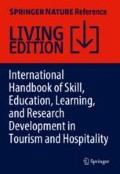
- Gagandeep Soni 2 ,
- Sarah Hussain 3 &
- Firdous Ahmad Shah 3
Part of the book series: Springer International Handbooks of Education ((SIHE))
35 Accesses
Psychology in tourism has its own key implications. Tourism studies must incorporate tourists as they are the dynamic participants. This chapter defines the significance of psychological know-how associated with tourism practice. Experiences generated are inclined toward expectation fulfillment and past events and are construed in the memory of the tourists resulting in the formation of new expectancies. Since the tourist experience is subjective in nature, and every experience created is unique, intrinsic, and personal to a tourist, it is important to understand the implementation of the concept of general psychology associated with tourists. The concept of tourist psychology in association with the notion of tourist experience is a topic of significance as it provides a foundation for the future tourist behavior. Destination selection, travel motivations, and utilization of services along with the satisfaction and memories created are important aspects of general psychology related to tourism practices. Understanding the antecedents and consequences in context to the tourist experience is equally substantial in tourism research. The tourist experience is complex and is an interface with the destination of visit wherein the destinations compose the actual experience site and the tourists are the actors of that experience. The notion of “tourist experience” is an intricate and a multifaceted psychological process which should be understood and studied by the destination marketers in association with the tourist motivations and their desire to travel.
This is a preview of subscription content, log in via an institution to check access.
Access this chapter
Institutional subscriptions
Aho, S. K. (2001). Towards a general theory of touristic experiences: Modelling experience process in tourism. Tourism Review, 56 (3/4), 33–37. https://doi.org/10.1108/eb058368
Article Google Scholar
Alba, J. W., & Williams, E. F. (2013). Pleasure principles: A review of research on hedonic consumption. Journal of Consumer Psychology, 23 (1), 2–18. https://doi.org/10.1016/j.jcps.2012.07.003
Alberti, F. G., & Giusti, J. D. (2012). Cultural heritage, tourism and regional competitiveness: The Motor Valley cluster. City, Culture and Society, 3 (4), 261–273. https://doi.org/10.1016/j.ccs.2012.11.003
Arnegger, J., Woltering, M., & Job, H. (2010). Toward a product-based typology for nature-based tourism: A conceptual framework. Journal of Sustainable Tourism, 18 (7), 915–928. https://doi.org/10.1080/09669582.2010.485680
Baker, M. J., & Cameron, E. (2008). Critical success factors in destination marketing. Tourism and Hospitality Research, 8 (2), 79–97. https://doi.org/10.1057/thr.2008.9
Baker, D., & Cameron, M. (2012). Tourism experience management and marketing: Consumer and managerial perspectives . Routledge.
Google Scholar
Baloglu, S., & Brinberg, D. (1997). Affective images and destination loyalty: An integrative theory. Annals of Tourism Research, 24 (4), 868–897.
Beritelli, P., Bieger, T., Laesser, C., & Wittmer, A. (2015). Challenging ‘common knowledge’ in tourism–A partial polemic. Tourism and Leisure: Current Issues and Perspectives of Development , 23–38.
Binkhorst, E., & Dekker, T. D. (2009). Agenda for co-creation tourism experience research. Journal of Hospitality Marketing & Management, 18 , 311–327.
Buckley, R., & Chalip, L. (2004). Memory-based motivation: Toward a theory of motivation and tourism behavior. Annals of Tourism Research, 31 (3), 574–595.
Buhalis, D. (2001). The tourism phenomenon: The new tourist and consumer. In C. Wahab & S. Cooper (Eds.), Tourism in the age of globalisation (pp. 69–96). Routledge. https://doi.org/10.4324/9780203995853
Chapter Google Scholar
Buhalis, D., & O’Connor, P. (2006). Information communication technology. In D. Buhalis & C. Costa (Eds.), Tourism business frontiers consumers, trends, management and tools (pp. 196–209). Butterworth-Heinemann.
Campos, A. C., Mendes, J., Valle, P. O. D., & Scott, N. (2018). Co-creation of tourist experiences: A literature review. Current Issues in Tourism, 21 (4), 369–400. https://doi.org/10.1080/13683500.2015.1081158
Chandralal, L., & Valenzuela, F. R. (2013). Exploring memorable tourism experiences: Antecedents and behavioural outcomes. Journal of Economics, Business and Management, 1 (2), 177–181.
Chen, W. (2015). Research on the relationship between tourist experience and its influencing factors as well as after travel behavior intention . Doctoral dissertation, Yunnan University, China.
Chen, C. F., & Chen, F. S. (2010). Experience quality, perceived value, satisfaction and behavioral intentions for heritage tourists. Tourism Management, 31 (1), 29–35. https://doi.org/10.1016/j.tourman.2009.02.008
Chi, C. G., Qu, H., & Wang, D. (2008). Examining the impacts of word-of-mouth on tourist behavior: An integrative theory. Annals of Tourism Research, 35 (3), 757–779.
Clawson, M. (1963). Land and water for recreation . Rand McNally.
Clawson, M., & Knetsch, J. (1966). Economics of outdoor recreation . John Hopkins. https://doi.org/10.4324/9781315064215
Book Google Scholar
Cohen, E. (2008). The changing faces of contemporary tourism. Society, 45 (4), 330–333. https://doi.org/10.1007/s12115-008-9108-2
Craig-Smith, S., & French, C. (1994). Learning to live with tourism . Pitman. https://doi.org/10.1177/135676679500100409
Crompton, J. L. (1979a). An assessment of the image of Mexico as a tourist destination and the influence of geographical location upon that image. Journal of Travel Research, 17 (4), 18–23. https://doi.org/10.1177/004728757901700404
Crompton, J. L. (1979b). Motivations for pleasure vacation. Annals of Tourism Research, 6 (4), 408–424.
Doliński, D. (2018). Is psychology still a science of behaviour? Social Psychological Bulletin, 13 (2), 1–14. https://doi.org/10.5964/spb.v13i2.25025
Cole, S. T., & Scott, D. (2004). Examining the mediating role of experience quality in a model of tourist experiences. Journal of Travel & Tourism Marketing, 16 (1), 79–90.
Eide, D., Fuglsang, L., & Sundbo, J. (2017). Management challenges with the maintenance of tourism experience concept innovations: Toward a new research agenda. Tourism Management, 63 , 452–463. https://doi.org/10.1016/j.tourman.2017.06.029
Ek, R., Larsen, J., Hornskov, S. B., & Mansfeldt, O. K. (2008). A dynamic framework of tourist experiences: Space-time and performances in the experience economy. Scandinavian Journal of Hospitality and Tourism, 8 (2), 122–140. https://doi.org/10.1080/15022250802110091
Filep, S. (2007). ‘Flow’, sightseeing, satisfaction and personal development: Exploring relationships via positive psychology. In Proceedings of 2007 Council for Australian University Tourism and Hospitality Education (CAUTHE): Tourism – Past achievements, future challenges, 11–14 February . Sydney: University of Technology, Sydney and the University of New South Wales.
Flanagan, O. (1991). The science of the mind (2nd ed.). The MIT Press. https://doi.org/10.7551/mitpress/6076.001.0001
Foster, A., & Kreuz, P. (2002). Erlebnismarketing – Erlebnisse bieten, die alla Sinne ansprechen . Future Trend Institute.
Fuchs, G. (2010). Time to let go? Theoretical and empirical insights into travel as a temporary escape from the workplace. Journal of Vacation Marketing, 16 (2), 103–115.
Garrod, B. (2007). Market segments and tourist typologies for diving tourism. In New frontiers in marine tourism (pp. 31–47). Routledge. https://doi.org/10.4324/9780080551081
Gartner, W. C. (1994). Image formation process. Journal of Travel & Tourism Marketing, 2 (2–3), 191–216. https://doi.org/10.1300/J073v02n02_12
Goeldner, C. R., & Ritchie, B. (2003). Tourism: Principles, practices, philosophies (9th ed.). Wiley.
Gössling, S., Scott, D., & Hall, C. M. (2020). Tourism and water: Interactions, impacts, and challenges . Channel View Publications.
Gunn, C. A. (1972). Vacationscape: Designing tourist regions . Bureau of Business Research.
Hjalager, A. M. (2003). A typology of gastronomy tourism. In Tourism and gastronomy (pp. 35–49). Routledge.
Hoarau-Heemstra, H., & Eide, D. (2019). Values and concern: Drivers of innovation in experience-based tourism. Tourism and Hospitality Research, 19 (1), 15–26. https://doi.org/10.1177/1467358416683768
Hosany, S., & Gilbert, D. (2010). Measuring tourists’ emotional experiences toward hedonic holiday destinations. Journal of Travel Research, 49 (4), 513–526. https://doi.org/10.1177/0047287509349267
Igartua, J. J., & Gonzalez, M. E. (2003). Psychological benefits of travel. Tourism Management, 24 (4), 471–480.
Ihamäki, P. (2012). Geocachers: The creative tourism experience. Journal of Hospitality and Tourism Technology, 3 (3), 152–175. https://doi.org/10.1108/17579881211264468
Jennings, G. (1997). The travel experience of cruisers. In M. Oppermann (Ed.), Pacific Rim 2000: Issues, interrelations, inhibitors (pp. 94–105). CAB International.
Jennings, G. (2006). Perspectives on quality tourism experiences: An introduction. In Quality tourism experiences (pp. 1–21). Routledge.
Kao, Y. F., Huang, L. S., & Wu, C. H. (2008). Effects of theatrical elements on experiential quality and loyalty intentions for theme parks. Asia Pacific Journal of Tourism Research, 13 (2), 163–174. https://doi.org/10.1080/10941660802048480
Kesenheimer, J. S., & Greitemeyer, T. (2021). Going green (and not being just more pro-social): Do attitude and personality specifically influence pro-environmental behavior? Sustainability, 13 , 3560. https://doi.org/10.3390/su13063560
Killion, G. L. (1992). Understanding tourism . Central Queensland University.
Kim, J.-H. (2014). The antecedents of memorable tourism experiences: The development of a scale to measure the destination attributes associated with memorable experiences. Tourism Management, 44 , 34–45. https://doi.org/10.1016/j.tourman.2014.02.007
Kim, J. H., & Ritchie, B. W. (2012). Motivation-based typology: An empirical study of golf tourists. Journal of Hospitality & Tourism Research, 36 (2), 251–280. https://doi.org/10.1177/1096348010388661
Kim, J.-H., Ritchie, J. R., & Tung, V. W. (2010). The effect of memorable experience on behavioral intentions in tourism: A structural equation modeling approach. Tourism Analysis, 15 (6), 637–648. https://doi.org/10.3727/108354210X12904412049776
Kuppens, P. (2015). It’s about time: A special section on affect dynamics. Emotion Review, 7 (4), 297–300. https://doi.org/10.1177/1754073915590947
Larsen, S. (2007). Aspects of a psychology of the tourist experience. Scandinavian Journal of Hospitality and Tourism, 7 (1), 7–18. https://doi.org/10.1080/15022250701226014
Li, M., & Cai, L. A. (2012). The effects of personal values on travel motivation and behavioral intention. Journal of Travel Research, 51 , 473–487. https://doi.org/10.1177/0047287511418366
Ma, J., Gao, J., Scott, N., & Ding, P. (2013). Customer delight derived from theme park experiences: The antecedents of delight based on cognitive appraisal theory. Annals of Tourism Research, 42 (1), 359–381. https://doi.org/10.1016/j.annals.2013.02.018
March, R., & Woodside, A. (2005). Tourism behaviour: Travellers’ decisions and actions . CABI.
Martin, G. N., Carlson, N. R., & Buskist, W. (Eds.). (2007). Psychology (3rd ed.). Pearson.
Maslow, A. H. (1943). A theory of human motivation. Psychological Review, 50 (4), 370–396.
Mathisen, L. (2013). Staging natural environments: A performance perspective. Advances in Hospitality and Leisure, 9 , 163–183. https://doi.org/10.1108/S1745-3542(2013)0000009012
Maunier, C., & Camelis, C. (2013). Toward an identification of elements contributing to satisfaction with the tourism experience. Journal of Vacation Marketing, 19 (1), 19–39. https://doi.org/10.1177/1356766712468733
McKercher, B., & Du Cros, H. (2003). Testing a cultural tourism typology. International Journal of Tourism Research, 5 (1), 45–58. https://doi.org/10.1002/jtr.417
Melon, M. P., Herrera, C. F., & Sarasa, R. G. (2021). Analysis of antecedents and consequences of memorable tourist experiences (MTEs): A Spanish case study. Journal of Vacation Marketing, 27 (3), 346–360. https://doi.org/10.1177/1356766720987879
Morgan, M. (2007). ‘We’re not the barmy army!’: Reflections on the sports tourist experience. International Journal of Tourism Research, 9 , 361–372. https://doi.org/10.1002/jtr.637
Morgan, M., Lugosi, P., & Ritchie, J. (Eds.). (2010). The tourism and leisure experience: Consumer and managerial perspectives . Channel View Publications.
Murphy, P. E. (1985). Tourism: A community approach . Methuen. https://doi.org/10.4324/9780203068533
Nawijn, J., Marchand, M. A., Veenhoven, R., & Vingerhoets, A. J. (2010). Vacationers happier, but most not happier after a holiday. Applied Research in Quality of Life, 5 (1), 35–47. https://doi.org/10.1007/s11482-009-9091-9
Neuhofer, B., Buhalis, D., & Ladkin, A. (2012). Conceptualising technology enhanced destination experiences. Journal of Destination Marketing & Management, 1 (1–2), 36–46. https://doi.org/10.1016/j.jdmm.2012.08.001
O’Dell, T. (2007). Tourist experiences and academic junctures. Scandinavian Journal of Hospitality and Tourism, 7 (1), 34–45. https://doi.org/10.1080/15022250701224001
Ooi, C. (2003). Crafting tourism experiences: Managing the attention product . Paper presented at the 12th Nordic symposium on tourism and hospitality research (pp. 1–26), Stavanger.
Park, S., & Santos, C. A. (2017). Exploring the tourist experience: A sequential approach. Journal of Travel Research, 56 (1), 16–27. https://doi.org/10.1177/0047287515624017
Park, D. B., & Yoon, Y. S. (2009). Segmentation by motivation in rural tourism: A Korean case study. Tourism Management, 30 , 99–108. https://doi.org/10.1016/j.tourman.2008.03.011
Pearce, P., Filep, S., & Ross, G. (2011). Tourists, tourism and the good life . Routledge. https://doi.org/10.4324/9780203845868
Pine, B. J., & Gilmore, J. H. (1999). The experience economy: Work is theatre and every business a stage . Harvard Business School Press.
Plog, S. C. (1973). Why destination areas rise and fall in popularity. Cornell Hotel and Restaurant Administration Quarterly, 14 (4), 55–58.
Quan, S., & Wang, N. (2004). Towards a structural model of the tourist experience: An illustration from food experiences in tourism. Tourism Management, 25 (3), 297–305. https://doi.org/10.1016/S0261-5177(03)00130-4
Selstad, L. (2007). The social anthropology of the tourist experience. Exploring the “middle role”. Scandinavian Journal of Hospitality and Tourism, 7 (1), 19–33. https://doi.org/10.1080/15022250701256771
Shaw, C., & Ivens, J. (2002). Building great customer experiences . Palgrave MacMillan. https://doi.org/10.1057/9780230554719
Shaw, G., & Williams, A. M. (2000). The impact of tourists’ expectations on their perceptions of the quality of their experiences. Annals of Tourism Research, 27 (3), 749–766.
Stamboulis, Y., & Skayannis, P. (2003). Innovation strategies and technology for experience-based tourism. Tourism Management, 24 (1), 35–43. https://doi.org/10.1016/S0261-5177(02)00047-X
Volo, S. (2009). Conceptualizing experience: A tourist-based approach. Journal of Hospitality Marketing & Management, 18 (2–3), 111–126. https://doi.org/10.1080/19368620802590134
Wang, T. L., Tran, P. T. K., & Tran, V. T. (2017). Destination perceived quality, tourist satisfaction and word-ofmouth. Tourism Review, 72 (4), 392–410.
Wearing, S. L., & Foley, C. (2017). Understanding the tourist experience of cities. Annals of Tourism Research, 65 , 97–107. https://doi.org/10.1016/j.annals.2017.05.007
Zhang, H., Wu, Y., & Buhalis, D. (2018). A model of perceived image, memorable tourism experiences and revisit intention. Journal of Destination Marketing & Management, 8 , 326–336. https://doi.org/10.1016/j.jdmm.2017.06.004
Zhang, J., Babin, B. J., & Kim, J. (2019). Pleasure or usefulness? Exploring the hedonic and utilitarian motivations behind social media use among Generation Z travelers. Journal of Travel Research, 58 (5), 824–839.
Zhou, B. L. (2016). The relationships among emotional experience, satisfaction and behavioral intentions . North-Western University.
Download references
Author information
Authors and affiliations.
Banarsidas Chandiwala Institute of Hotel Management & Catering Technology, New Delhi, India
Gagandeep Soni
Department of Tourism and Hospitality Management, Jamia Millia Islamia, New Delhi, India
Sarah Hussain & Firdous Ahmad Shah
You can also search for this author in PubMed Google Scholar
Corresponding author
Correspondence to Gagandeep Soni .
Editor information
Editors and affiliations.
Dept. of Commerce and Management, University of Kota, Kota, Rajasthan, India
Anukrati Sharma
Rights and permissions
Reprints and permissions
Copyright information
© 2024 This is a U.S. Government work and not under copyright protection in the U.S.; foreign copyright protection may apply
About this entry
Cite this entry.
Soni, G., Hussain, S., Shah, F.A. (2024). The Tourist Psychology and the Creation of Tourist Experiences. In: Sharma, A. (eds) International Handbook of Skill, Education, Learning, and Research Development in Tourism and Hospitality. Springer International Handbooks of Education. Springer, Singapore. https://doi.org/10.1007/978-981-99-3895-7_6-1
Download citation
DOI : https://doi.org/10.1007/978-981-99-3895-7_6-1
Received : 21 June 2023
Accepted : 27 August 2023
Published : 20 October 2023
Publisher Name : Springer, Singapore
Print ISBN : 978-981-99-3895-7
Online ISBN : 978-981-99-3895-7
eBook Packages : Springer Reference Education Reference Module Humanities and Social Sciences Reference Module Education
- Publish with us
Policies and ethics
- Find a journal
- Track your research
Experiential tourism: a rising trend
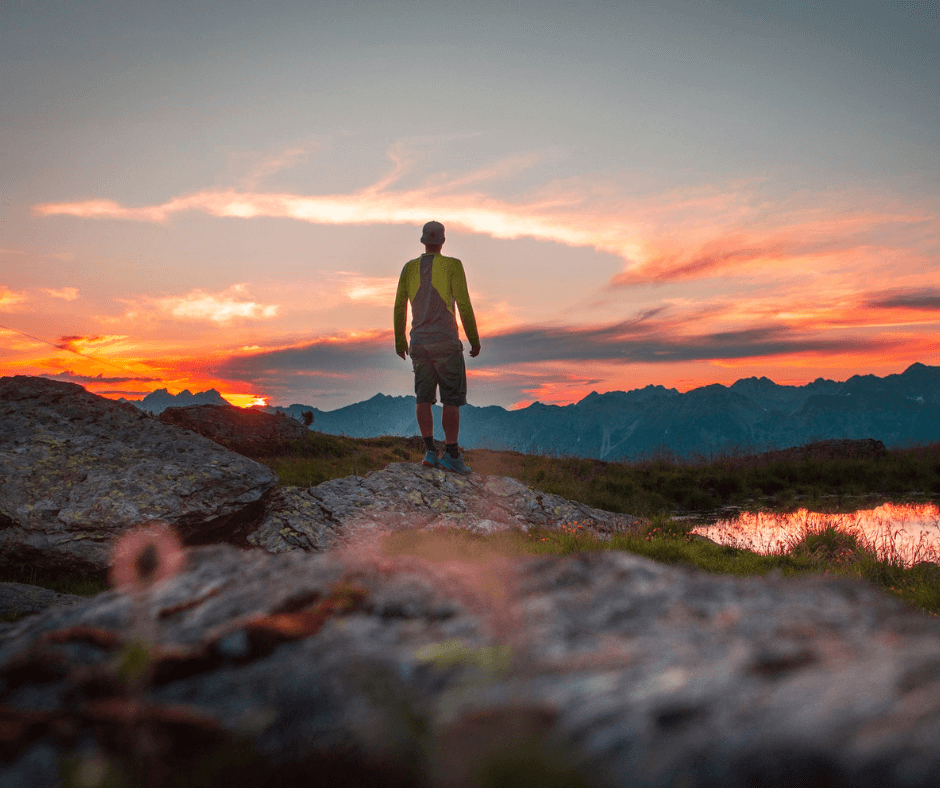
Experiential tourism is a trend that is continually developing and something every destination should be able to offer.
Experiential travel can change one’s perspective on things by seeing the way other people live. It also helps let go the stereotypes people might have about a community, a place, a certain group of people.
In this article, we will explore this type of tourism.
Experiential Tourism: a definition
Also known as ‘immersion travel’ or ‘experiential travel’ , experiential tourism is a form of travel in which the focus is on the experience . Therefore, experiential travellers want to experience a country, city or particular place by actively and meaningfully engaging with its history, people, culture, food and environment.
To summarize, immersion travel provides diverse experiences that match the visitor’s interests and provides a sense of personal accomplishment, thereby creating their own unique memories.
The different forms of Experiential Tourism
There are different ways in which people can immerse themselves in a way that leads to some sort of discovery, insight or inspiration. Because the term experiential tourism is broad, it naturally encompasses many types of tourism and holidays that come in all sorts of shapes and sizes.
Let’s see some of them.
Uniqueness is one of the biggest assets that a place can have when it comes to experiential tourism.
Smaller destinations can differentiate themselves by focusing on the unique experiences they offer. These unique experiences include travelling to places that are off the beaten path to create an immersive experience and build a connection to a place rather than to just see it.
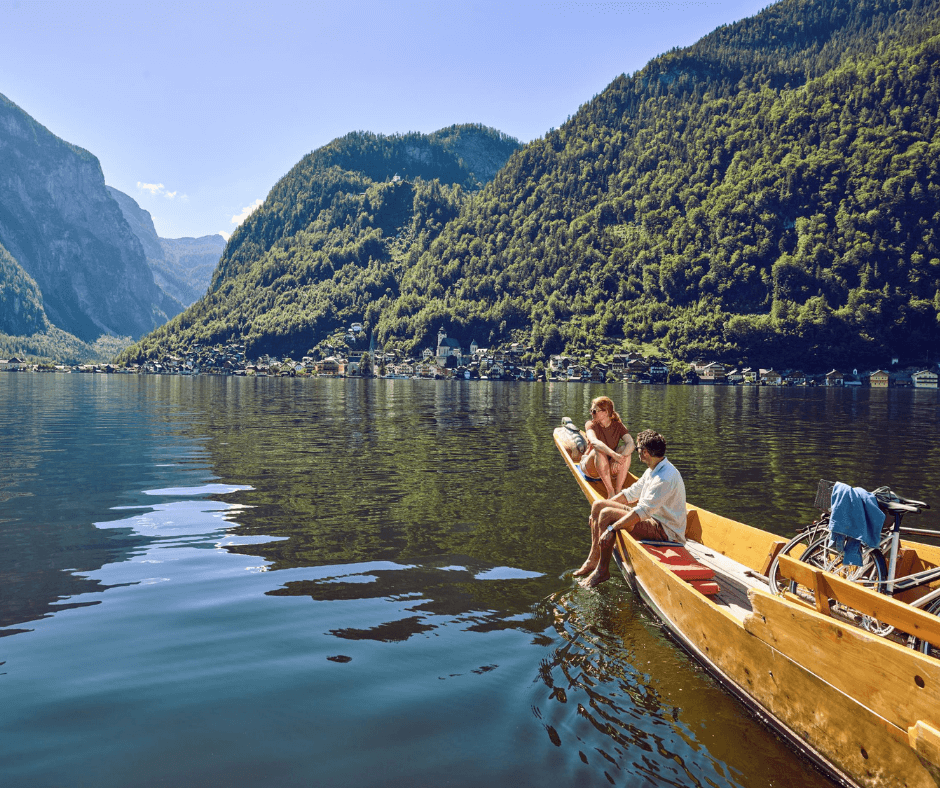
Sustainability
Sustainable tourism is an important type of experiential travel. Although the issue of sustainability is important, it might not always be practical to travel sustainably, especially for the mainstream tourist destinations.
On the other hand, tourists who are interested in experiential tourism would support the preservation of local culture, historic architecture, ecosystems and other aspects of their destination by spending their travel budget there.

Bregenzerwald-Blick-auf-Schwarzenberg_c_Popp-Hackner_Vorarlberg-Tourismus
Authenticity and local culture
Many travellers, who choose immersive travel, do it because they want to live a truly authentic experience and get to know the local culture .
There are different ways in which they can do so, such as learning a new language, picking up some new recipes, getting to know the history of a culture they may not have even heard of before.
By spending the time travelling to places to see and interact with local people, tourists can help communities to achieve positive economic and social outcomes.
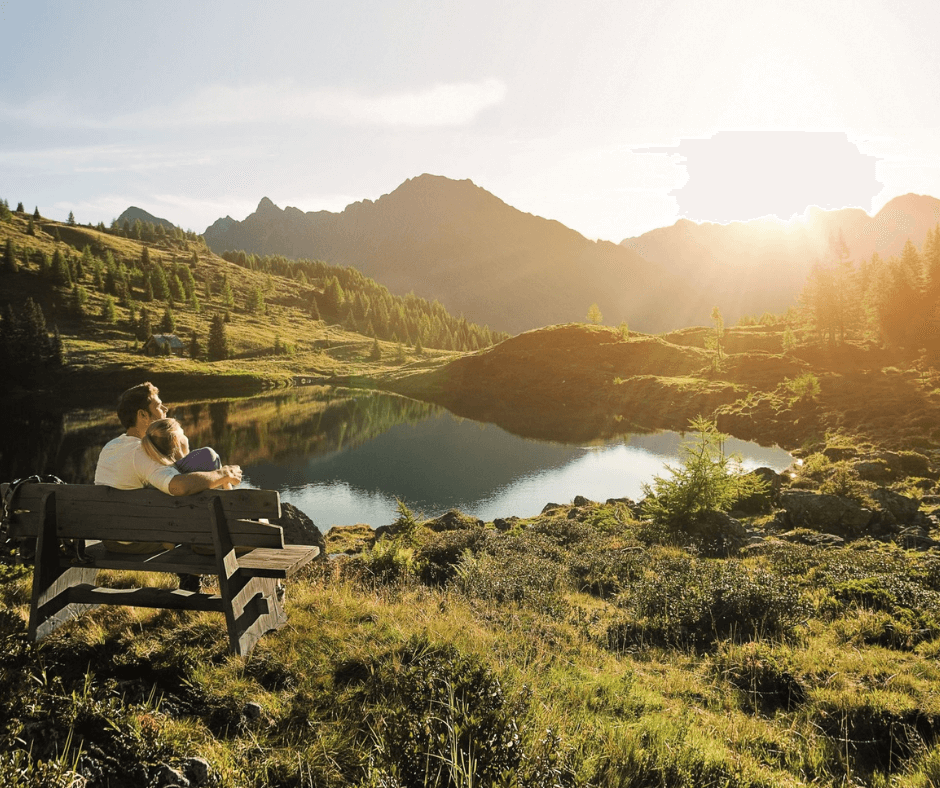
Volunteering
One of the most popular forms of experiential travel is volunteer tourism .
Many youth travellers (also so-called “gap-year” tourists) seek experiences with an educational angle . Some of these involve volunteering on development projects in the chosen destination.
The reasons why some people choose this type of experiential tourism are different . Some may choose to volunteer to get beyond the tourist trail and immerse themselves socially among different cultures and networks. Others may feel that volunteering is important to support local communities and have a strong desire to give back. And then some simply have a desire to seek adventures and explore new horizons.
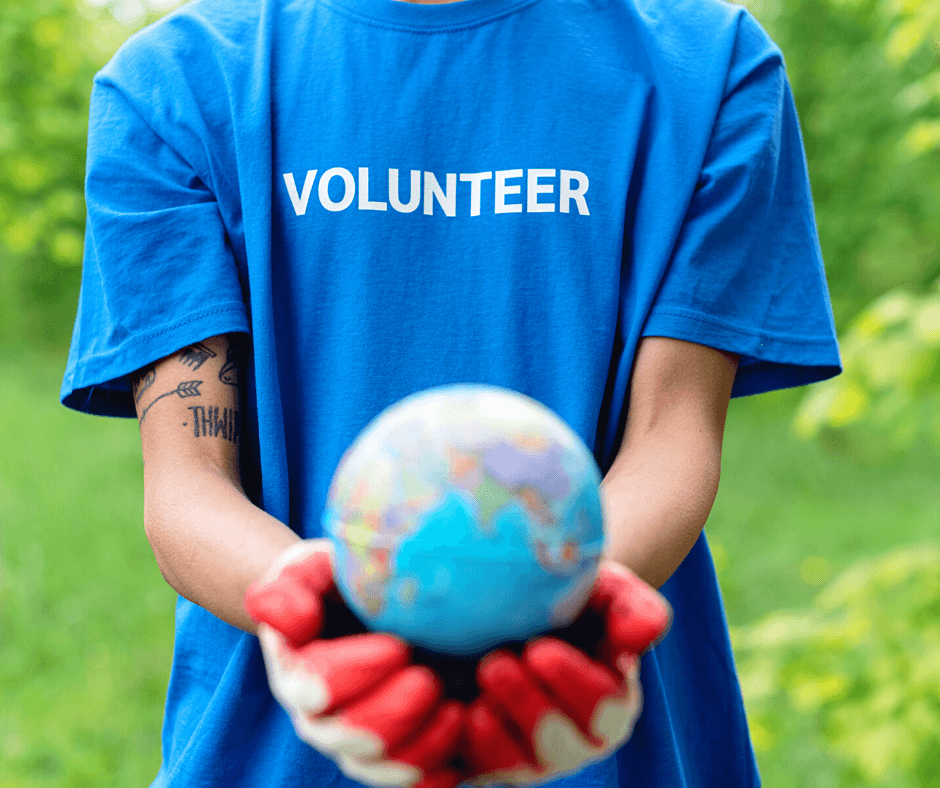
Culinary experiences
The final rising trend we will explore in this article is culinary – or food – tourism .
This type of experiential travel encompasses any travel experience in which the individual is willing to learn about, appreciate and indulge in food and drink that reflects the culture, heritage and cuisine of the destination.
Culinary tourism is not about the food people eat. In fact, it is not necessarily related to luxury dining experiences, but it’s more about eating adventurously and adopting an open-minded attitude in search for new culinary traditions .
Food tourism can involve cooking classes and wine tastings experiences, or visiting neighbourhood markets and restaurants with a local guide.

All our hotels in Europe offer experiences and not just rooms. So, book a stay, live a memorable experience and be the own protagonist of your holiday.
Share This Story, Choose Your Platform!
Let’s keep in touch be the first to hear about interesting news and updates.
All fields are required

Experiential Tourism
What is experiential tourism.
Experiential tourism is a form of tourism in which people focus on experiencing a country, city or particular place by actively and meaningfully engaging with its history, people, culture, food and environment.
Creating a Unique Experience:
- Focus on your strengths – base your product on what natural and cultural resources you have that others don’t.
- Plan all stages of the project in detail before commencing, including marketing, product evaluation and redevelopment. Plan for and monitor budgets tightly.
- Be very clear about what you want to achieve – profit, local employment, community pride and involvement, and conservation of the resource.
- Consult and involve the local community in the creation of the experience.
- Take the time to do the project well. Do not rush the stages of consultation and product development. Innovation does not happen overnight.
- Know your target audience. Plan and tailor the product from the consumer’s needs and perspectives. Undertake market research.
- Interpretation should be fun, encourage involvement, stimulate the senses, and pose a challenge. Plan all activities to reflect a strong theme.
- Choose methods that involve and engage the senses. Face to face interpretation is the most effective.
- Collaborate with experts in your local community.
- Train the interpretative team to ensure consistency of product and messages.
Standards for Experiential Tourism
This list is in the form of objective sentences. Each can be a consideration for further research.
- People create meaning through direct experience.
- The experience includes the people met, the places visited, the activities participated in and the memories created.
- The experience includes pre-departure trip planning and post-trip follow-up.
- Experiential tourism draws people into local nature, culture and history.
- Experiential tourism is low impact, low volume, and high yield.
- Experiential tourism is very personal, unique and individual for each visitor.
- Quality, memorable visitor experiences are a shared outcome between the visitor and the experience provider.
- Experiential tourism opportunities allow for personal growth and reflect the values and interests of the individual visitor.
- Experiential tourism provides diverse experiences that match the visitor’s interests and provide a sense of personal accomplishment, thereby creating their own unique memories.
- The desired outcome of experiential tourism is to achieve a complete participatory experience that provides new knowledge and authentic experiences.
- Experiential tourism opportunities encourage the meeting and coming together of different cultures, their problems and potential.
- Cultural elements are shared in an atmosphere of traditional ways of life.
- Experiential tourism shows rather than describes.
- Experiential tourism opportunities expand personal horizons.
- Experiential tourism opportunities should provide personal enrichment, enlightenment, stimulation, and engagement as motivators.
- Experiential tourism attracts people to places.
- Experiential tourism attracts markets to merchandise.
- Experiential tourism engages all five senses.
- Experiential tourism opportunities include learning a new skill or engaging in a new activity.
- Experiential tourism includes “the story of the place.”
Eco Tourism
Ecotourism caters to tourists wishing to experience the natural environment without damaging it or disturbing its habitats. It is a form of tourism involving responsible travel to natural areas, conserving the environment, and improving the well-being of the local people.
Principles of Ecotourism:
- Appropriate Resources
- Benefit local communities
- Contributes to conservation
- Educational /Experiential
- Ecological compatible facilities
- Highest consumer satisfaction
- Truthful and ethical marketing
- Socially responsible
Involving the Local Community Through Participation:
- Local participation in the project cycle
- Create stakeholders
- Linking benefits to conservation
- Distribute benefits
- Identify community leaders
- Bring about change
- Understand site specific conditions
- Monitoring and evaluating progress
For more information on ecotourism, visit the links below:
- Nature Conservancy Canada
- The International Ecotourism Society
- Ontario Ministry of the Environment
Community Tourism
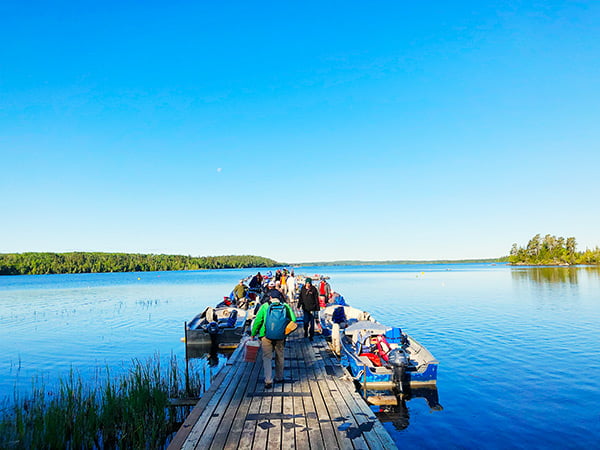
In response to the challenges and uncertainties induced by globalization and other factors, many rural communities in Atlantic Canada and throughout the world have adopted tourism development as an alternative approach in hopes to achieve some sense of sustainability.
Rural communities rely on their culture and cultural symbols, including artifacts, music, folklore, architecture, heritage and geographic landscapes, as a focal feature for tourism development. In fact, local culture, generally defined as the longstanding traditions, customs and values of a community, has become a dominant attractor for drawing tourists to Canada and elsewhere. Many of these small rural communities have a cultural richness and uniqueness that are frequently depicted in various tourism product offerings, marketing publications and media. In short, local culture is increasingly being objectified and modified to entice tourists to specific destination areas. In tandem to providing new sites of consumption, we are seeing a new wave of demand – cultural tourists – eager to consume a variety of new and novel cultural experiences.
Cultural and heritage tourism are continually gaining momentum as approaches to tourism development. These are, generally, understood as type of special interest tourism where heritage or cultural objects, for example, museums, ancient buildings, sites and artifacts, are prepared and presented for visitor experience.
Some Principles in Community Tourism are:
- This form of tourism should be run with the involvement and consent of the local communities. Local people should be the planners, organizers and overall managers of these tours.
- A fair share of the profits should go back to the community.
- It involves communities rather than individuals.
- Be environmentally sustainable
- Respect traditional culture and social structures.
- Have mechanisms that helps communities deal with the impact of tourist
- Keep groups small to minimize social/environmental impacts
- Brief tourist before the trips about appropriate behavior
- Do not make local people perform inappropriate ceremonies.
- Leave communities alone if they do not want tourism.
Community tourism offers an excellent opportunity for outfitters in the Northern Ontario region to team up and create extended itineraries for their operations. The added advantage is that it does not have to interfere with the core product offering but gives the added advantage of having a wider choice to ensure guest of all preferences are made happy.
The process to initiate action for community tourism development can come from any individual or organization. NOTO will work directly with any organization, business or individual to provide guidance and technical support to get the process of community tourism development going.
The introduction of the new tourism regions will bring about some changes to the development dynamics.
Culture and Heritage Tourism
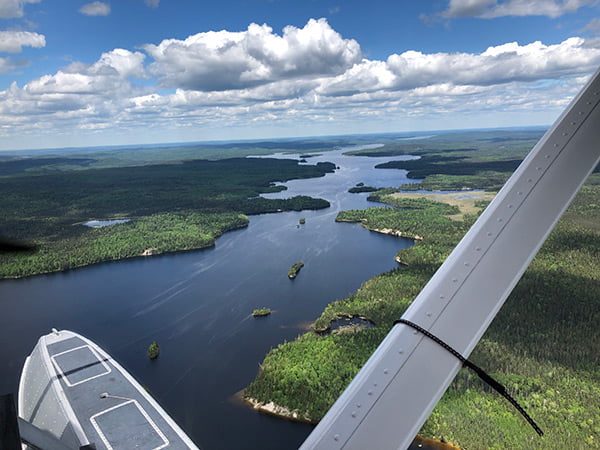
Cultural heritage tourism is the fastest growing segment of the tourism industry because there is a trend toward an increase specialization among tourists (Prof Keith Hollingshead). This trend is evident in the rise in the volume of tourists who seek adventure, culture, history, archaeology and interaction with local people.
Cultural heritage tourism is important for various reasons; it has a positive economic and social impact, it establishes and reinforces identity, it helps preserve the cultural heritage, with culture as an instrument it facilitates harmony and understanding among people, it supports culture and helps renew tourism (Richards, 1996).
In the design to research and develop cultural heritage tourism in Region 13, a number of objectives can be met within the context of sustainable tourism. This will depend on the consultations and expressed desires and concerns of the local community stakeholders.
The conservation of cultural resources, accurate interpretation of resources, authentic visitors’ experience, and the stimulation of the earned revenues of cultural resources are all objectives that can be kept in mind. Cultural heritage tourism development will not only be concerned with identification, management and protection of the heritage values but it will also be involved in understanding the impact of tourism on communities and regions, achieving economic and social benefits, providing financial resources for protection, as well as marketing and promotion
Heritage tourism involves visiting historical or industrial sites that may include old canals, railways, battlegrounds, river markings and so forth. The overall purpose is to gain an appreciation of the past. It also refers to the marketing of a location to members of a Diasporas who have distant family roots there.
Another possible form involves religious travel. Heritage Tourism can also be attributed to historical events that have been dramatized to make them more entertaining. Heritage tourism focuses on certain historical events, rather than presenting a balanced view of that historical period. Its aim may not always be the presentation of accurate historical facts, as opposed to economically developing the site and surrounding area. As a result heritage tourism can be seen as a blend of education, entertainment, preservation and profit.
Road Map to Cultural Heritage Tourism Development
Cultural heritage tourism.
“Travelling to experience the places and activities that authentically represents the stories and people of the past” (definition adopted from the US National Trust for Historic Preservation).
How do you make this happen?
Four Steps to Success!!!!
- Assess Your Potential
Plan and Organize
- Prepare for Visitors, Protect and Manage Your Natural, Cultural and Heritage Resources
Market for Success
Assess your potential.
Evaluate your assets in five main areas:
- Attractions – current and potential, the natural, cultural and historic attractions your area has to offer.
- Visitor services
- Organizational capability
Two main resources for planning and organizing are:
- Human – gain the support of the local business sector and local government
- Financial – Prepare a good financial plan, it is critical for your short and long term effectiveness
Prepare, Protect and manage
- Prepare – readying your historical resources by preserving their historical integrity.
- Protect – to ensure that your tourism cultural heritage resource has a long and productive life.
- Manage – A well managed cultural heritage tourism resource is one that balances competing considerations.
To draw people and money into your community, develop a multi-year, multi tiered plan!!
Include these four components in your marketing plan:
- Public Relations
- Advertising
- Graphic materials
http://www.mtc.gov.on.ca/en/heritage/heritage_toolkit.shtml
http://www.mtc.gov.on.ca/en/publications/Ontario_Cultural_and_Heritage_Tourism.pdf
Websites and Social Media
Social media is the use of web based and mobile technologies to turn communication into interactive dialogues. Social media can take on many different forms including internet forums, web blogs, social blogs, micro blogging, wiki, podcast, photographs and pictures.
Six Different types of social media
- Collaborative projects – (e.g. Wikipedia)
- Blogs and microblogs – (e.g. Twitter)
- Content communities – (e.g. YouTube)
- Social networking sites – (e.g. Facebook)
- Virtual game worlds – (e.g. World of Warcraft)
- Virtual social worlds – (e.g. Second Life)
Social Media is used to:
Communicate.
- Blogs – (e.g. Blogger)
- Microblogging – (e.g. Twitter)
- Location based social networking – (e.g. Facebook)
Collaboration and Authority Building
- Wikis – (e.g. Wikipedia)
- Social Bookmarking – (e.g. StumbleUpon)
- Content management systems – (e.g. WordPress)
- Photography and Art sharing – (e.g. Instagram)
- Video Sharing – (e.g. YouTube)
- Music and Audio sharing – (e.g. Pandora Radio)
Reviews and Opinions
- Product Reviews – (e.g. Epinions.com)
- Business Reviews – (e.g. Customer Lobby)
- Community question and answer – (e.g. Yahoo!Answers)
Entertainment
- Media and entertainment platforms – (e.g. YouTube)
- Virtual Worlds – (e.g. Second life)
- Game Sharing – (e.g. Kongregate)
Brand Monitoring
- Social media measurement – (e.g. Statsit)
Features of Social Media
- Quick to Start. You could launch a Facebook page today or get a blog going in a few days.
- Low Cost. You can get started in social media and blogging for very little or no money. They are among the most cost-effective methods of reaching your audience.
- Instant Interactivity. Both blogs and social media can give you nearly instant market feedback – good or bad. We get all kinds of feedback through the comments on our blog; people also leave reviews and other comments for us on Facebook, LinkedIn and other social media channels.
- It’s the Search Engines, Silly. Surveys indicate that 90% or more of people begin their purchasing process in search engines. Blogs and social media make it more likely that your prospects will find you online when they search.
- Inbound Marketing. NOTO is a big fan of inbound marketing! Outbound marketing is telemarketing, direct mail, cold email blasts , TV and print ads – all the things that buyers tend to block out more and more. Social media and blogs are essential inbound marketing tools.
- First Mover Advantage. For blogs and social media, there is an advantage to moving first. If you don’t jump into the conversation, your competitors will (if they have not already) and then you’re fighting an uphill battle to become influential in these online conversations. Start now to claim that first-mover advantage.
Tourist Outfitters Website Best Practice Guide
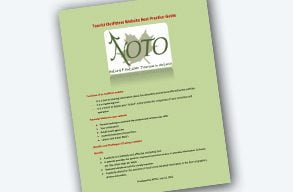
A Guide to Building Successful Packages for Tourism Suppliers…
This manual was compiled intending to act as a resource for operators who are ready to invest the time, trust and energy to build packages for visitors to Ontario and get them to the market. The manual moves beyond the theoritical and delve into ‘the now what’ stage.
Many examples are presented in this handbook. It is very practical. It provides you with the tools and process to design new combinations of experiences that will attract new or more customers to your operation.


IMAGES
VIDEO
COMMENTS
For some, experiential travel means doing anything that falls outside of a standard sightseeing, museum-going itinerary. For others, it is defined by interactions with locals or by going to places ...
Experiential travel, also known as immersion travel, is a form of tourism in which people focus on experiencing a country, city or particular place by actively and meaningfully engaging with its history, people, culture, food and environment. It can often be transformative. Therewith the concept is based on very similar mechanisms as for example experiential education, experiential knowledge ...
Experiential travel usually delves deeper into a given destination, ensuring visitors can experience it as authentically as possible. As such, tours tend to focus on less-touristy spots. Since the ...
Experiential travel is also known as immersion travel. This is because people ( tourists) are fully immersing themselves in a particular culture or a certain place - whether that be a specific site or a general country. When travelling in this way, tourists will actively seek out and engage in things that make the place what it is.
Experiential travel is a travel method that has been talked about for decades but has become increasingly popular over the last few years. It's essentially a way of traveling that allows you to really dig deep into the local culture and fully experience every new place you visit. Experiential tourism is mostly focused on experiences as ...
Equally, EXPERIENCE is about adapting and responding to the urgency of climate change and creating more sustainable options. The focus is on encouraging visitors to explore their local regions and tourists to travel off the beaten track. An experience should aim to stimulate the five senses (sight, hearing, touch, smell, and taste) and/or ...
Experiential travel can be defined as a form of tourism that focuses on engaging with a country's culture, food, history, heritage and environment. Rather than going to a foreign country and relying on familiar sights and experiences from back home, experiential tourism relies on truly that….experiencing. The experience itself can be ...
Experiential tourism is all about forming authentic connections with the communities and culture. It encourages travelers to go off the tourist trail and engage with locals, even when visiting mainstream tourist destinations, to experience other aspects of a particular location. Many travelers find that a good way to do this is to participate ...
Experiential travel is a form of tourism that implies an active and meaningful engagement with a destination's culture, people, and/or environment to create unique, memorable experiences. It's the story about visiting new destinations, keeping off the beaten path, encountering authentic local experiences, and just doing something ...
Experiential tourism is associated with a personal and subjective experience in which main attribute is interactivity. Experience tourism can be distinguished from traditional tourism by the fact that it engages all human senses. ... To the theoretical definition of experience tourism is paid more and more attention. To the experts in the field ...
As tourism outpaces other industries—forecasted to grow 3.7% in the face of other economies this year—it's experienced a revitalization. Experiential, adventure, responsible, and green travel are reinventing the way communities, ecosystems, economies, and brands interact. We examined these trends closer and how they're being embraced by ...
Experiential tourism is an increasingly influential trend in global tourism. The Covid-19 pandemic has left travellers seeking more immersive experiences which give a sense of adventure, discovery and culture . Experiential tourism aims for a deeper emotional connection for visitors and supports more sustainable and low impact tourism.
2. Authentic Cultural Immersion: Experiential tourism places a strong emphasis on cultural immersion. Travelers have the opportunity to participate in cultural activities, such as cooking classes ...
1 - EXPERIENTIAL TOURISM: DEFINITION. Experiential tourism (or experiential travel), a concept born from the fusion of cultural tourism and learning tourism, allows everyone to travel differently.By offering a unique experience to travellers, this form of tourism allows them to discover a region from the inside, immersing themselves completely in the daily life of the local population.
Experiential Tourism is a tourism concept that prioritizes the subjectivity aspect in its consumption patterns. This aspect of subjectivity affects tourists' interpretation of each destination ...
This paper examines the 'experiential tourism' concept as reported in the academic and practitioner literature. Examples of experiential tourism around the world are examined. Standards for the experiential tourism concept suggested by the literature are developed and presented. Using the standards framework developed, a specific rural regional planning process is used to describe a sample of ...
This paper reviews available academic and practitioner literature to develop a working definition of the "experiential tourism" concept, examines examples of "experiential tourism" activities around the world, and suggests a set of standards for an analytical framework. We then apply the framework to the local rural environment and it ...
The present paper addresses the theme "Experiential Tourism and Experiential Marketing" under the scope of the economy of experiences. The word "experience" appears to be very abstract and difficult to conceptualize due to its complexity and dynamic nature. Several authors, namely Pine and Gilmore, studied the theme and develop "The ...
The experiential dimension of tourism experience is an important aspect to be considered by the destination marketers (Maunier & Camelis, 2013). ... A detailed definition of tourist experience would thus comprise of the process of planning where the tourist plans the trip based on former expectations, the actual process when the trip is ...
Experiential Tourism: a definition. Also known as 'immersion travel' or 'experiential travel', experiential tourism is a form of travel in which the focus is on the experience. Therefore, experiential travellers want to experience a country, city or particular place by actively and meaningfully engaging with its history, people, culture ...
Experiential tourism is the opposite of mass tourism where tourism activities it has a low level of tourist participation, while experiential tourism encourages tourists to participate actively to ...
Experiential tourism provokes international vi sitors to rediscover new resources and cultural treasures t hat are little known globally. It ha s the potential to
Experiential tourism is a form of tourism in which people focus on experiencing a country, city or particular place by actively and meaningfully engaging with its history, people, culture, food and environment. ... Travelling to experience the places and activities that authentically represents the stories and people of the past" (definition ...